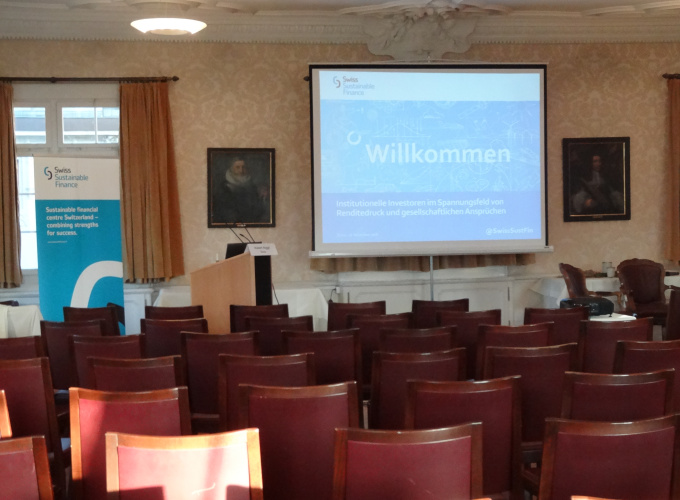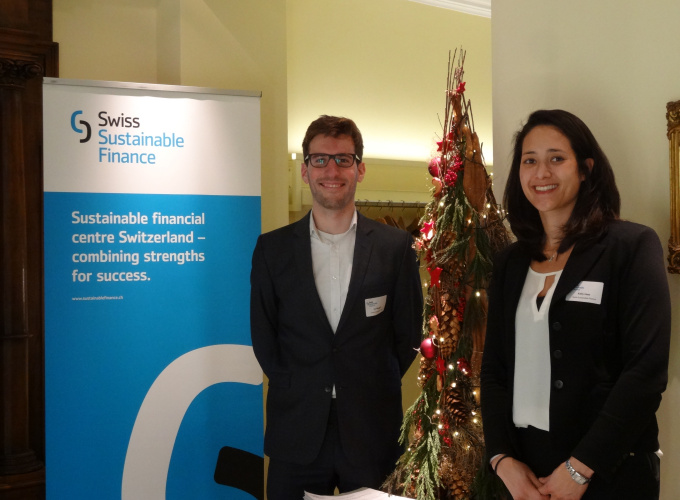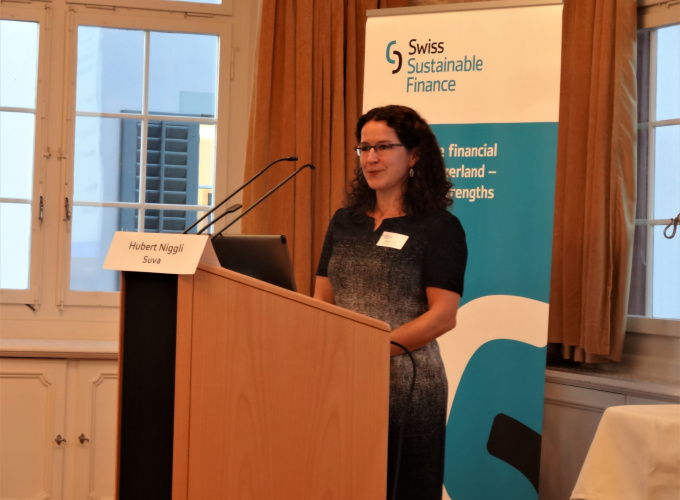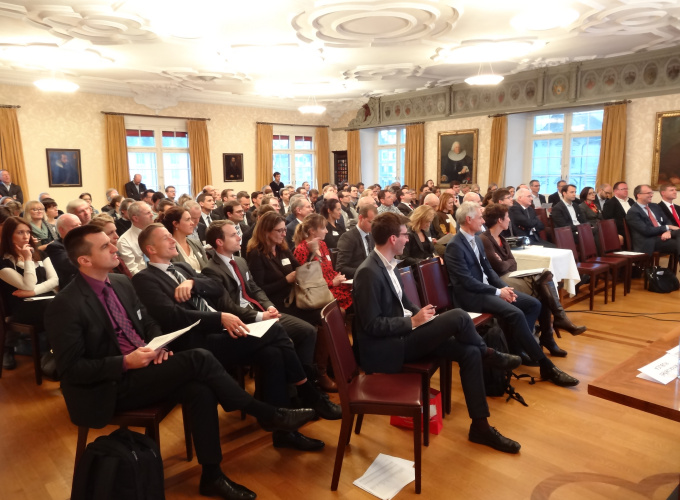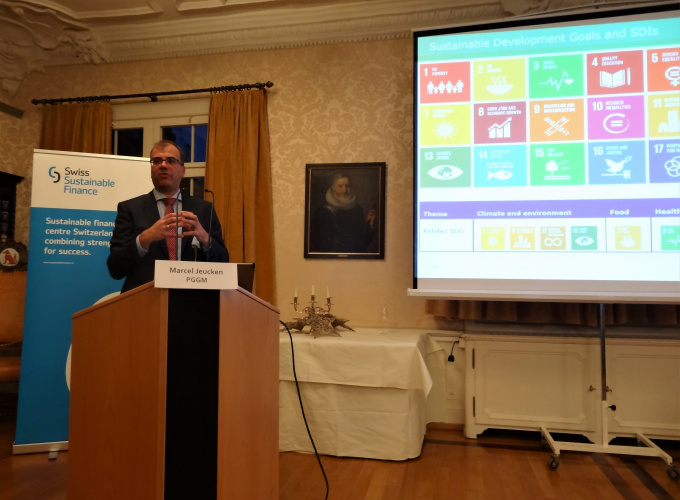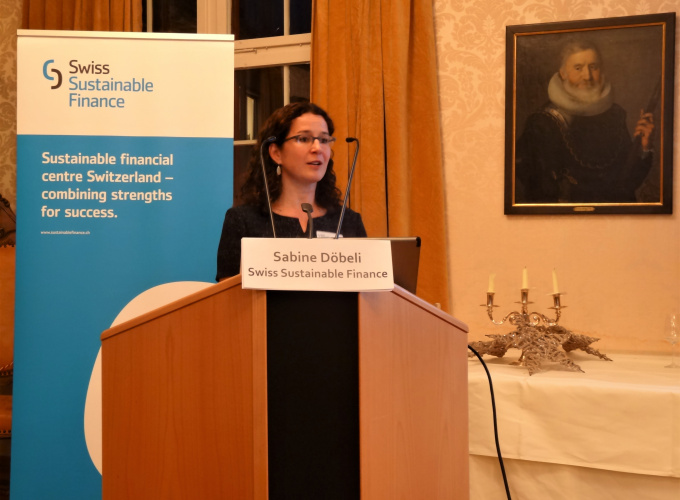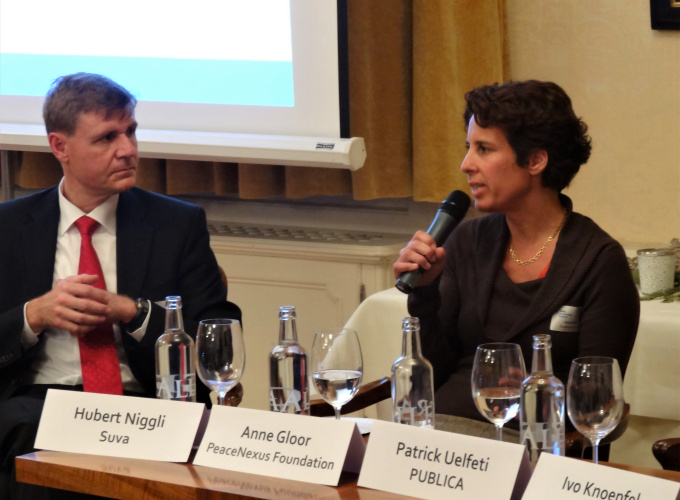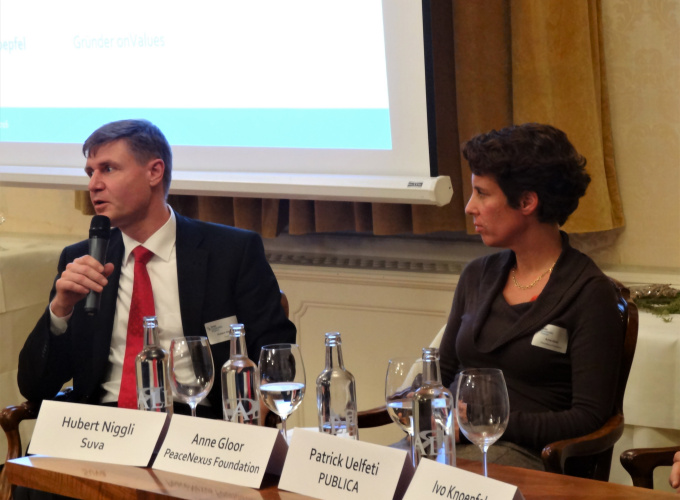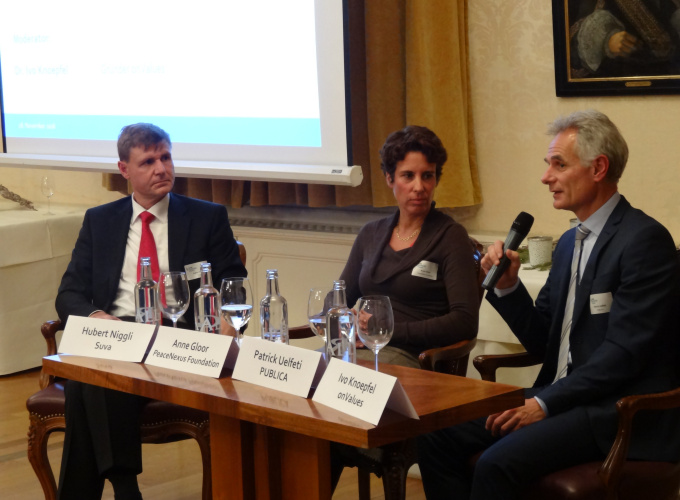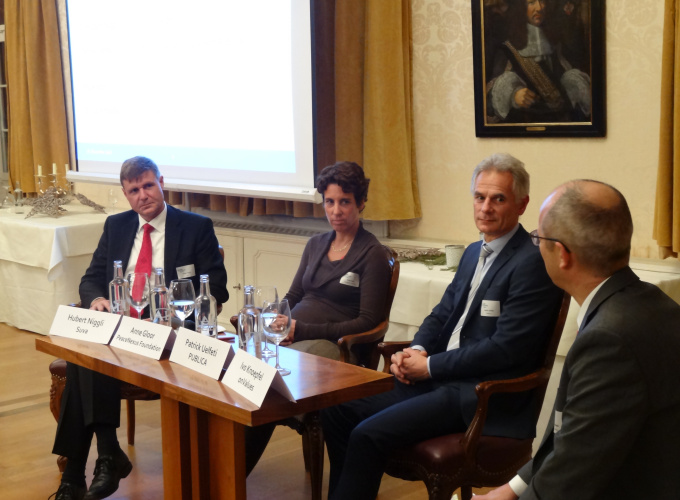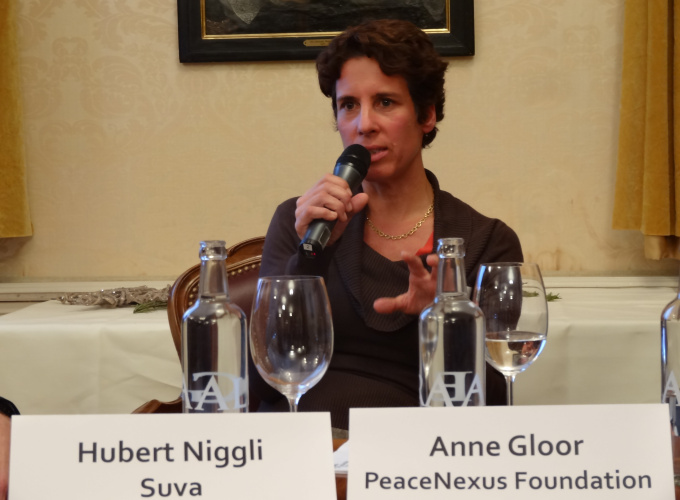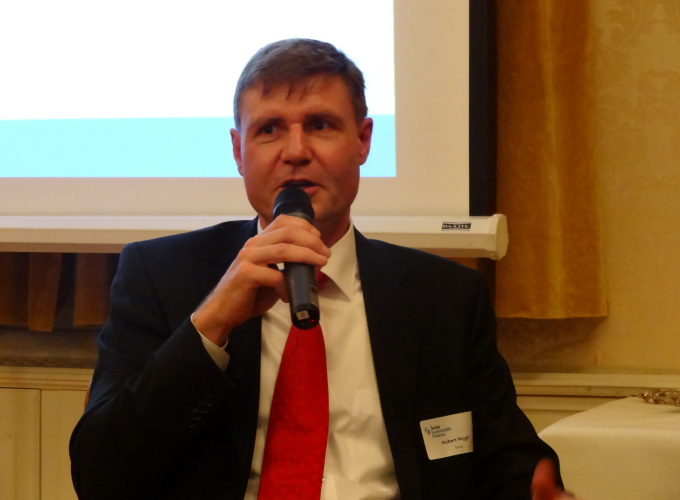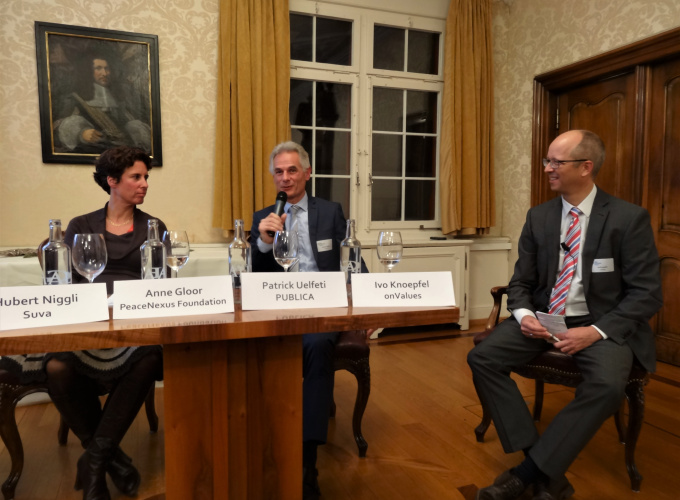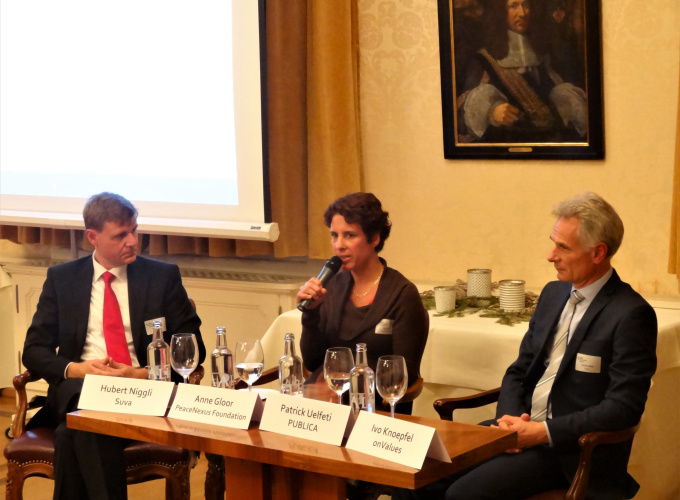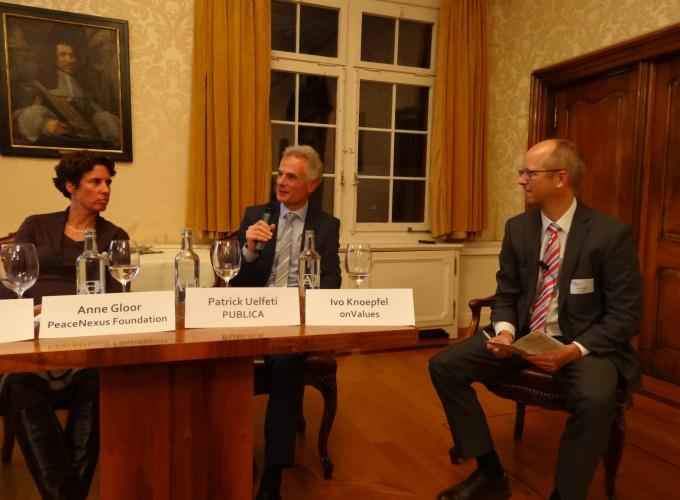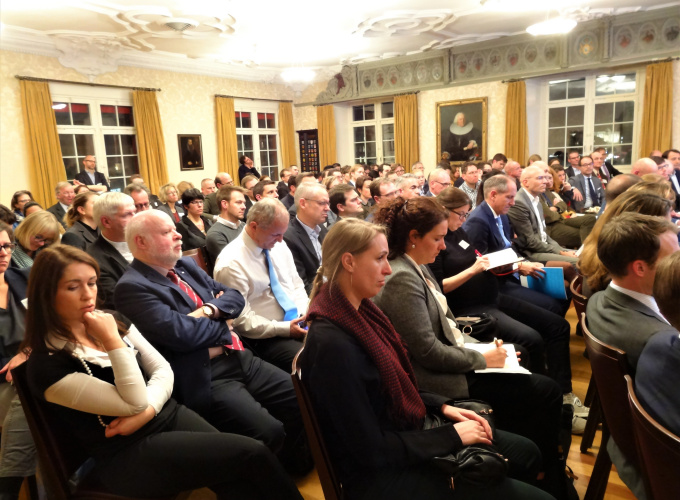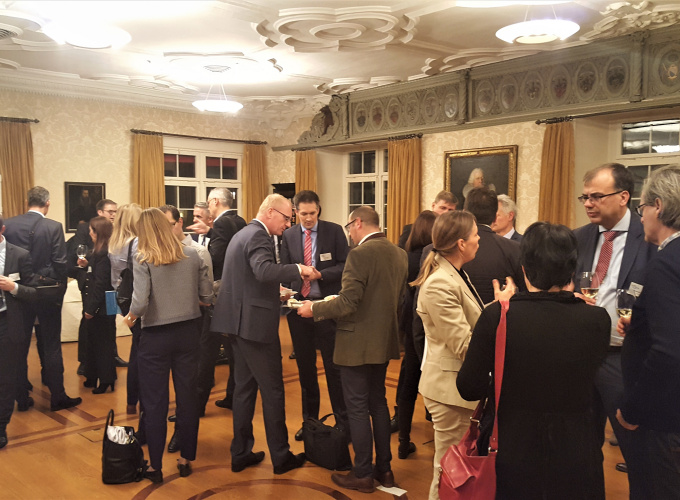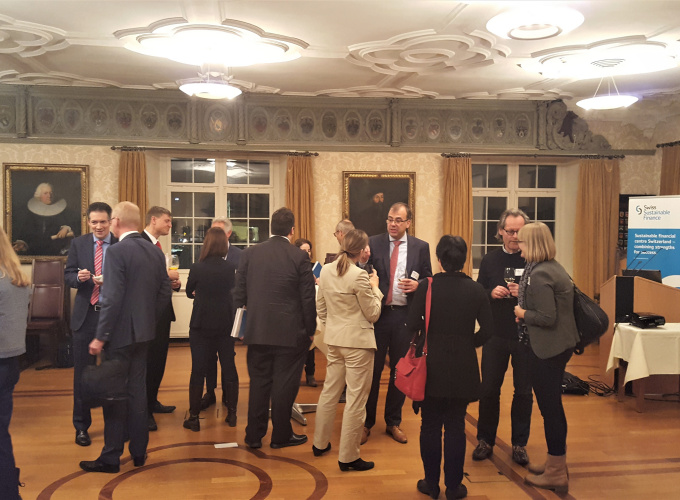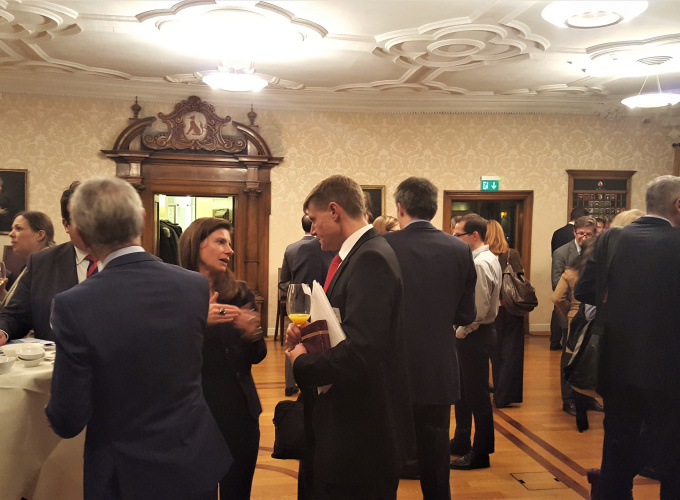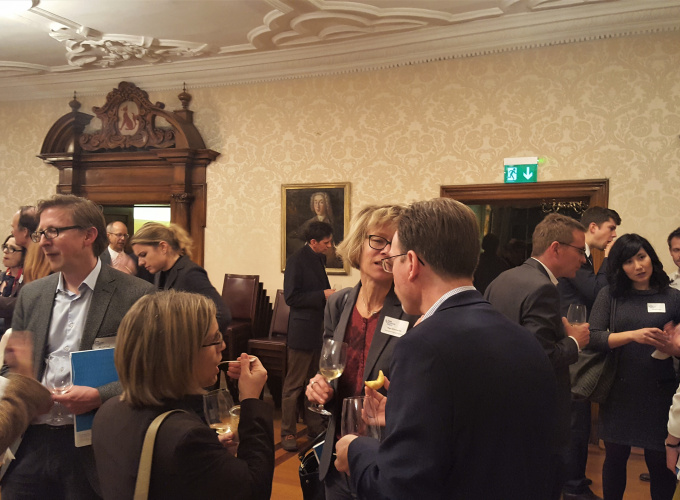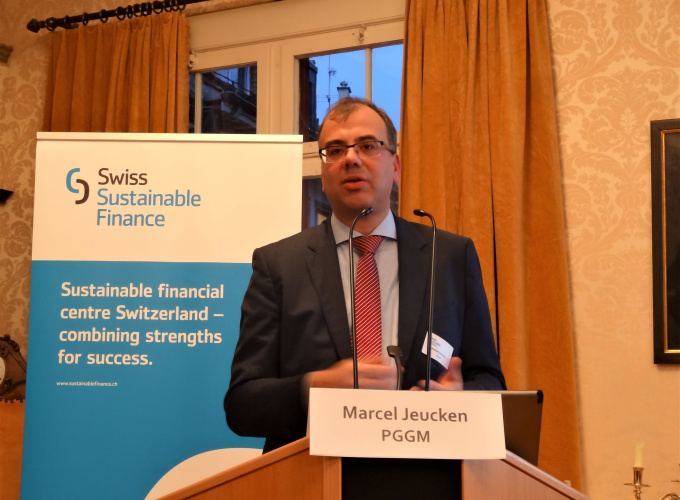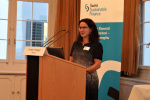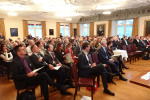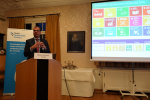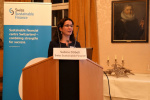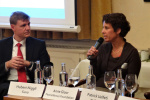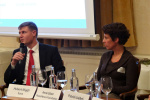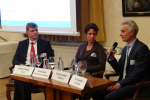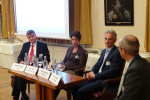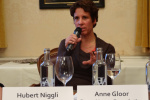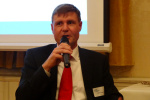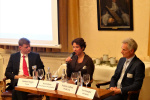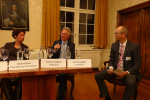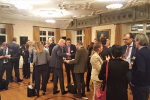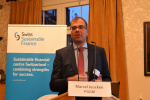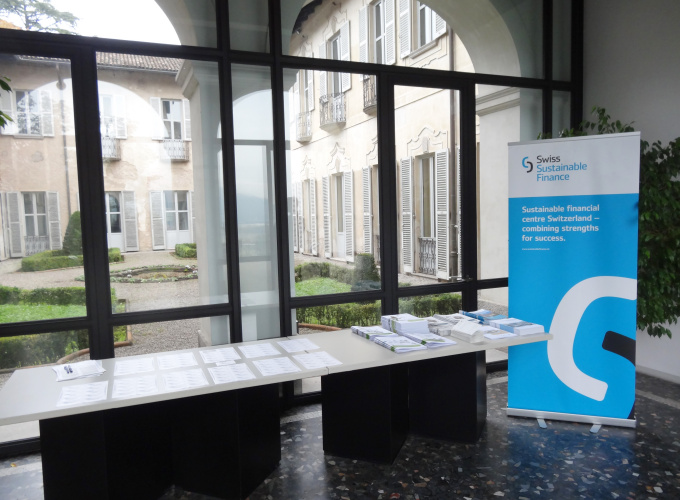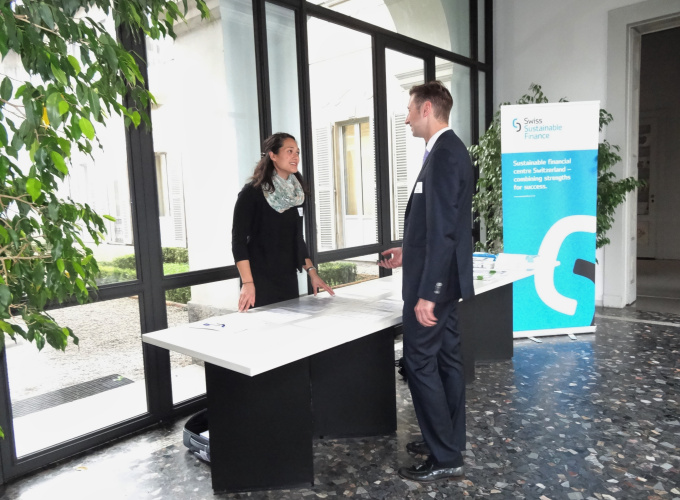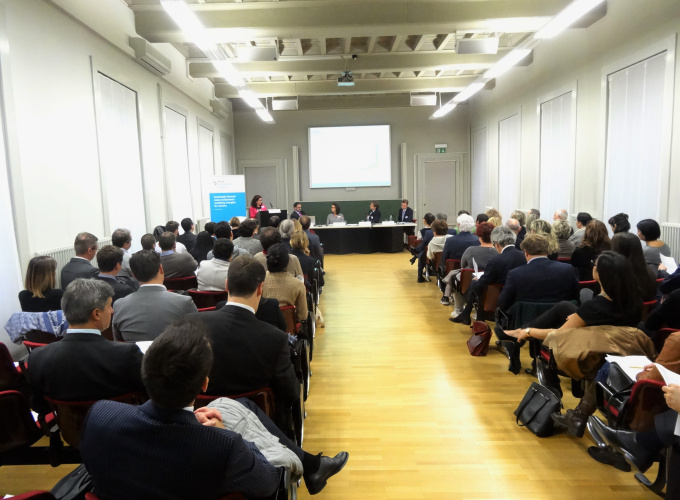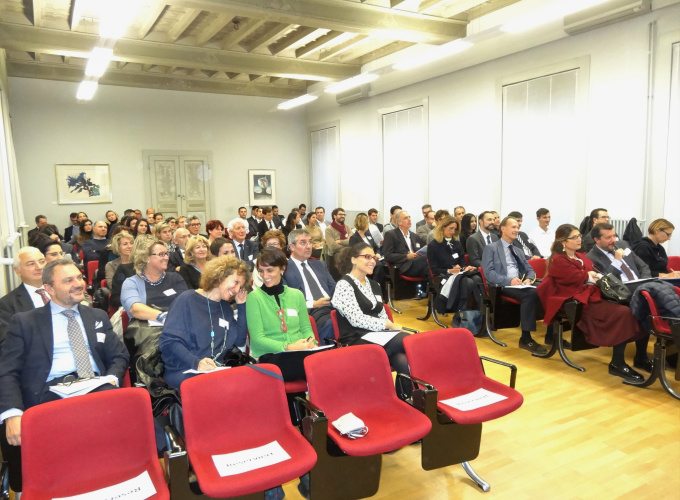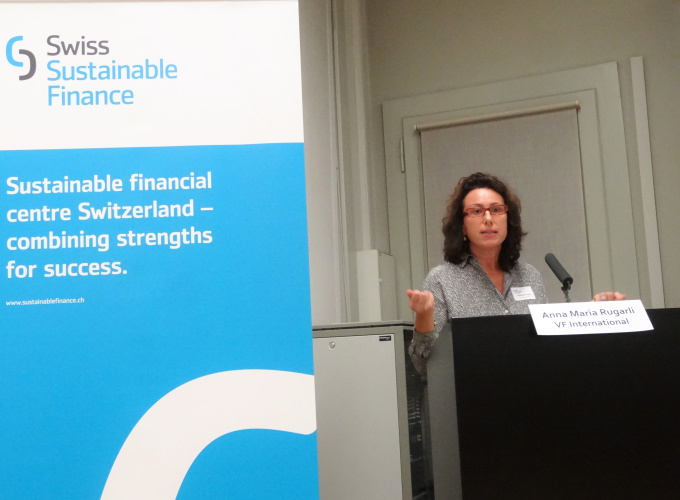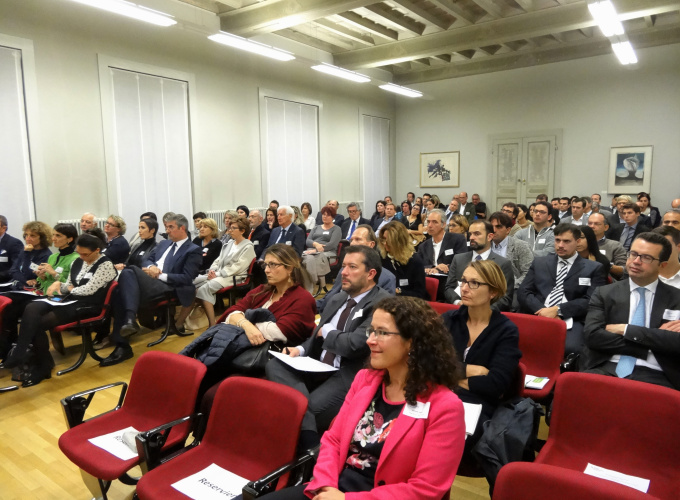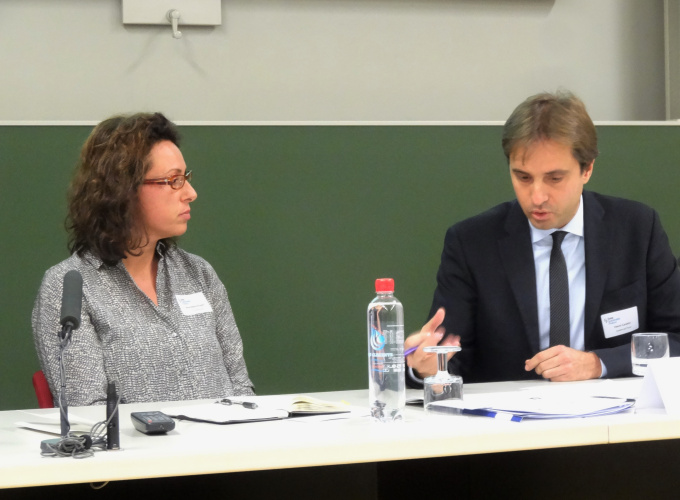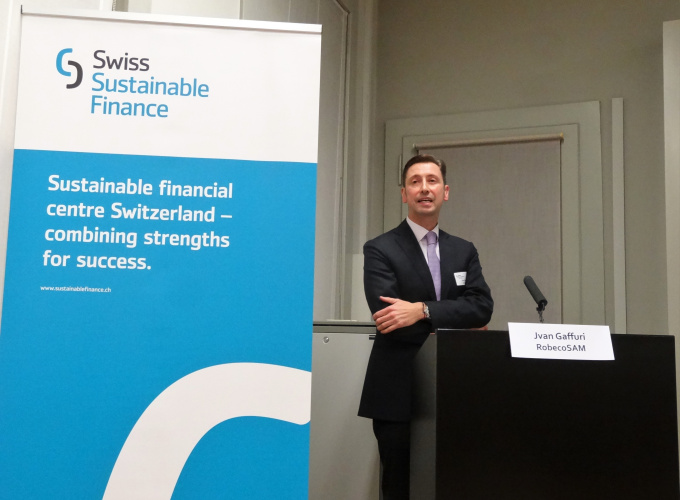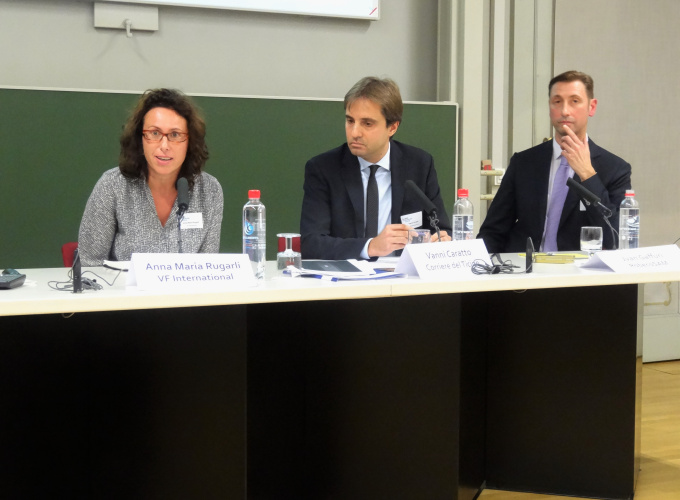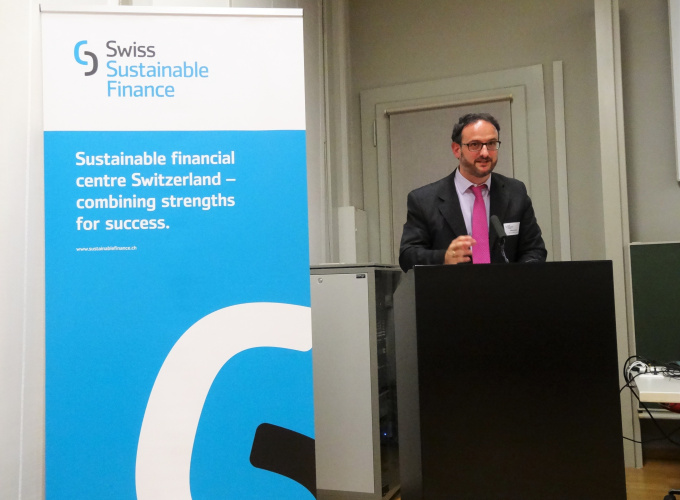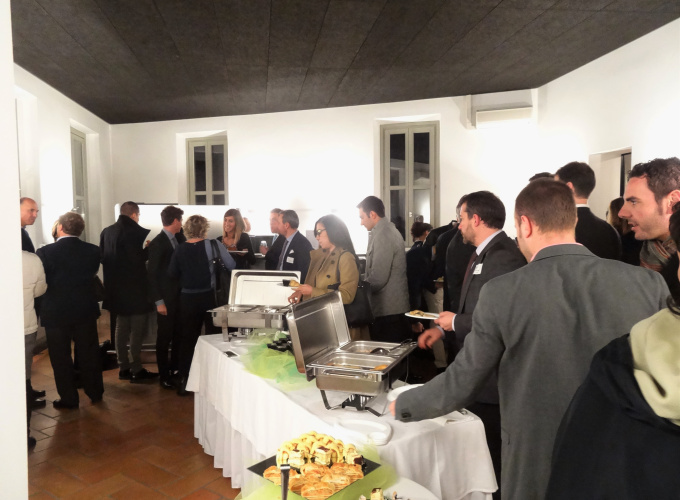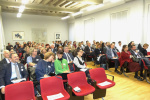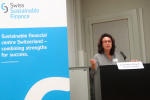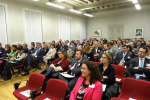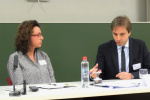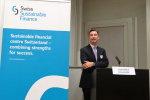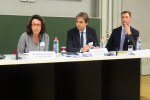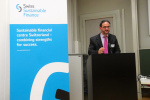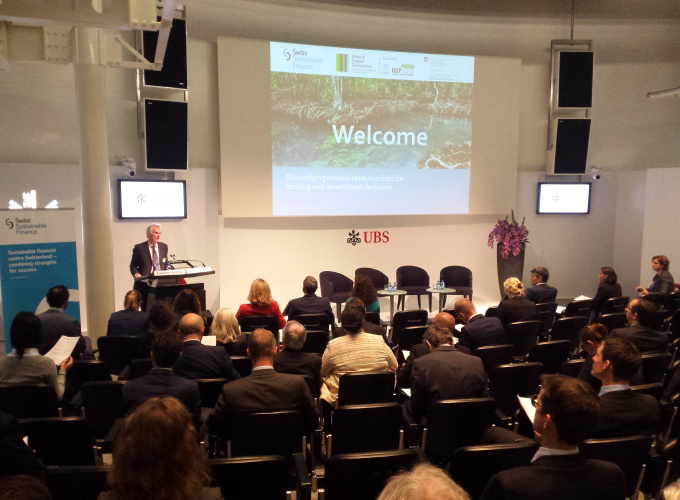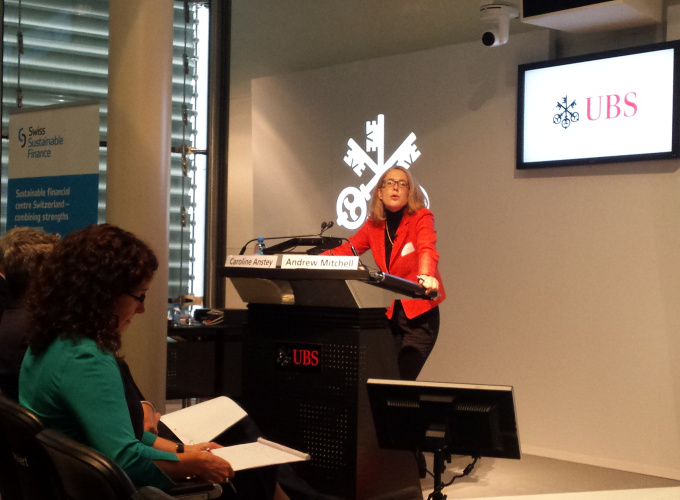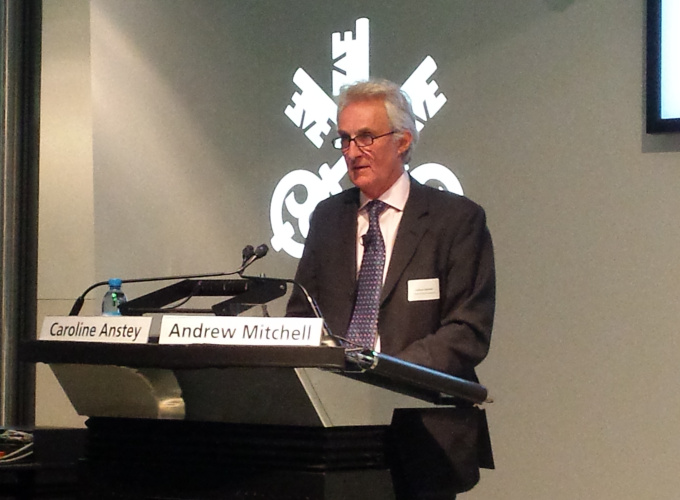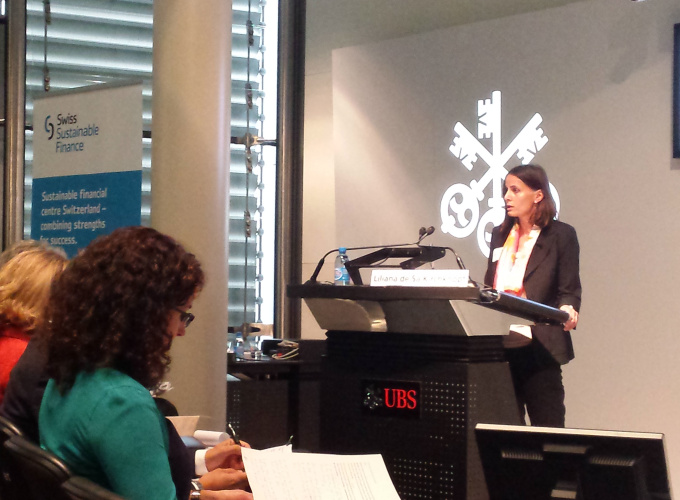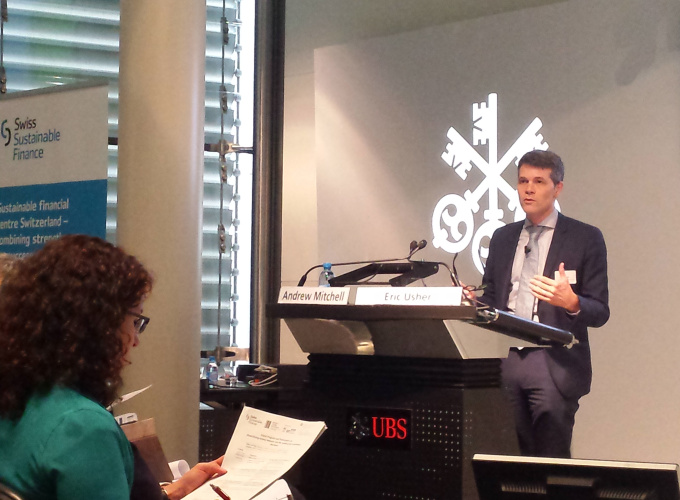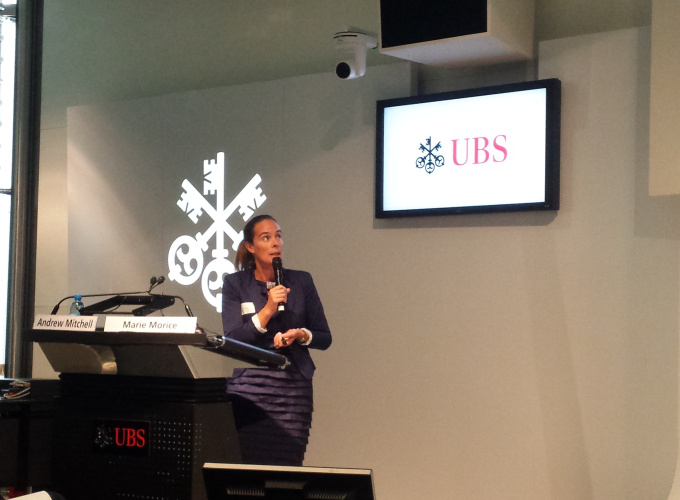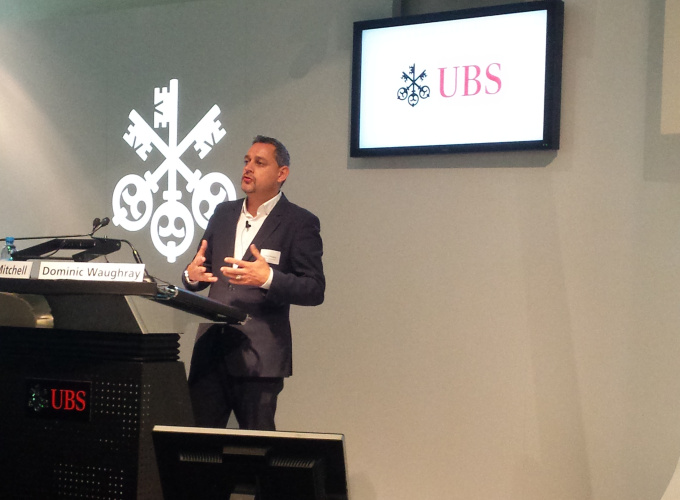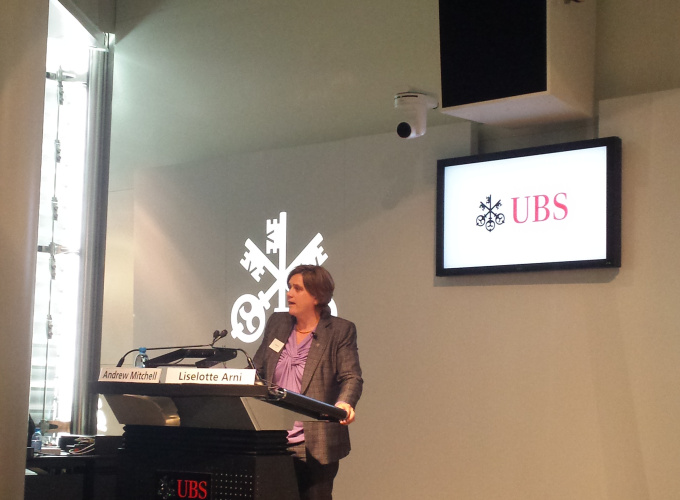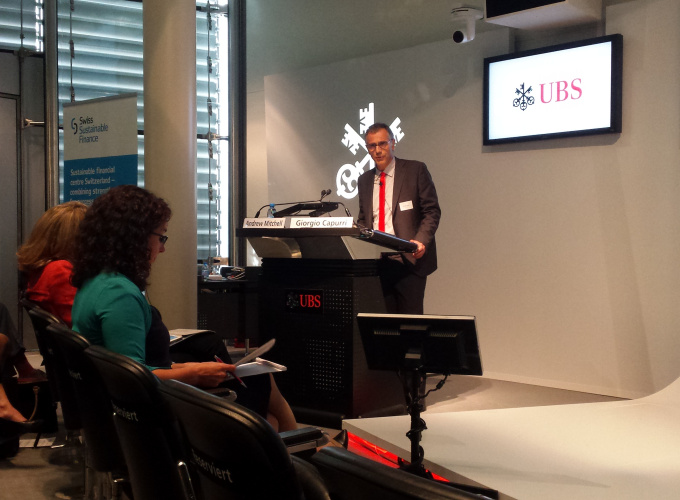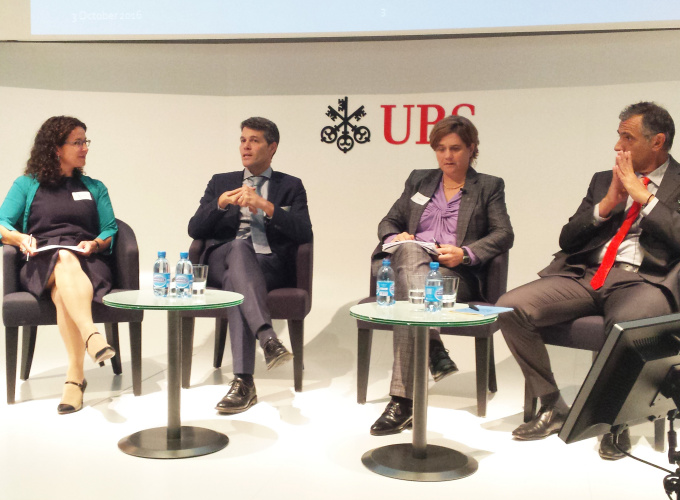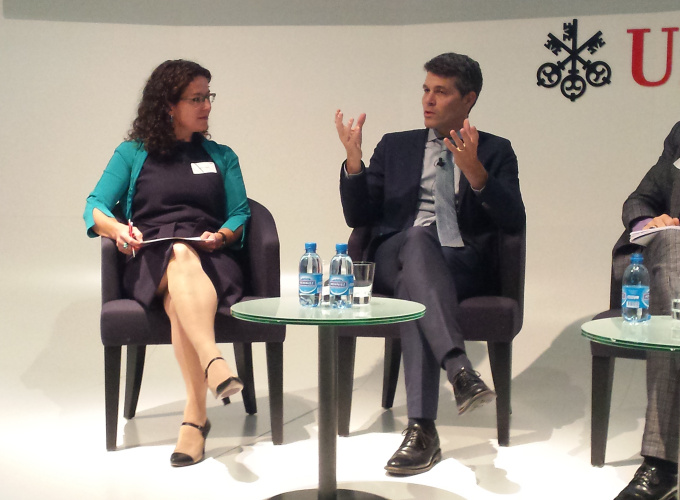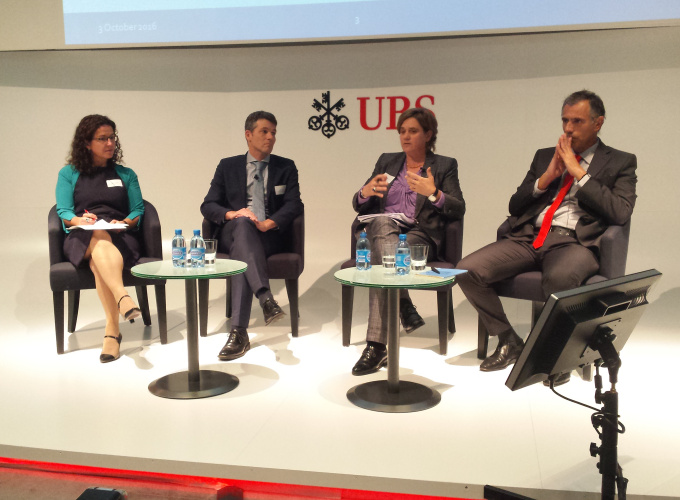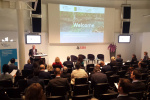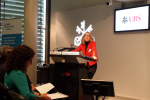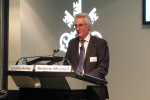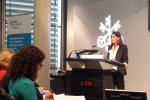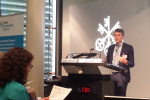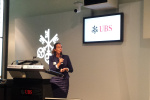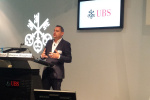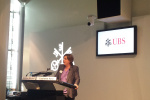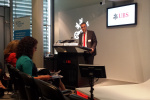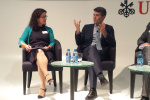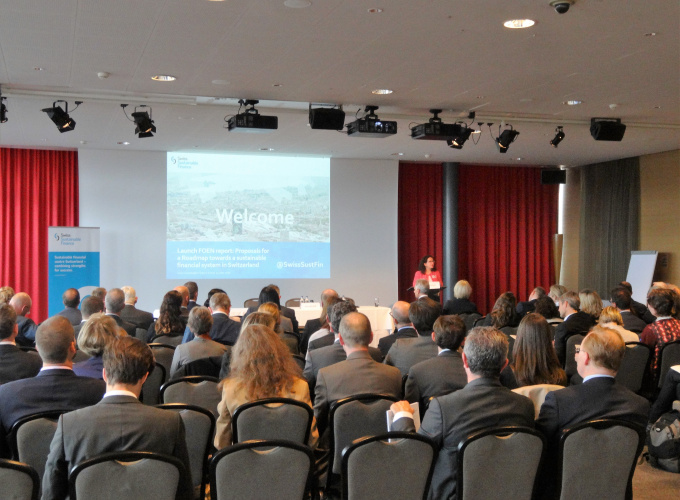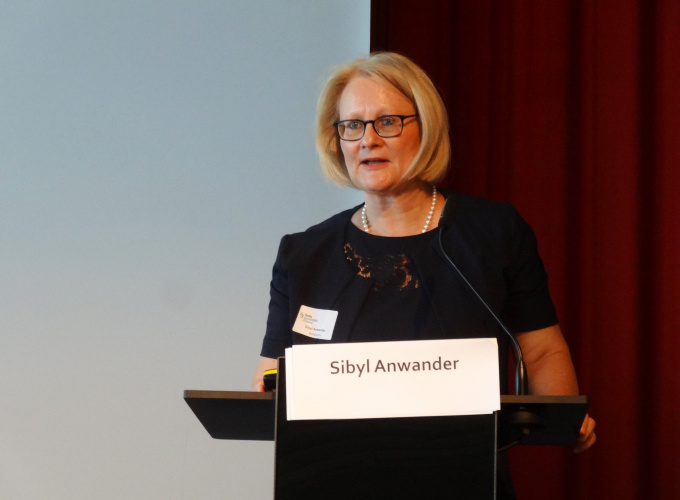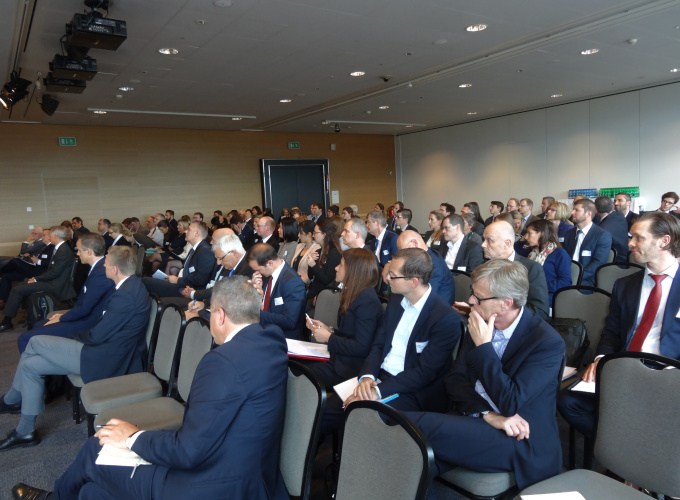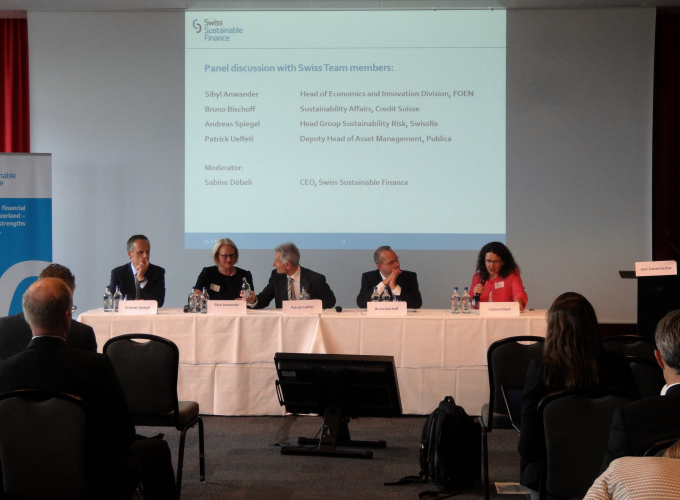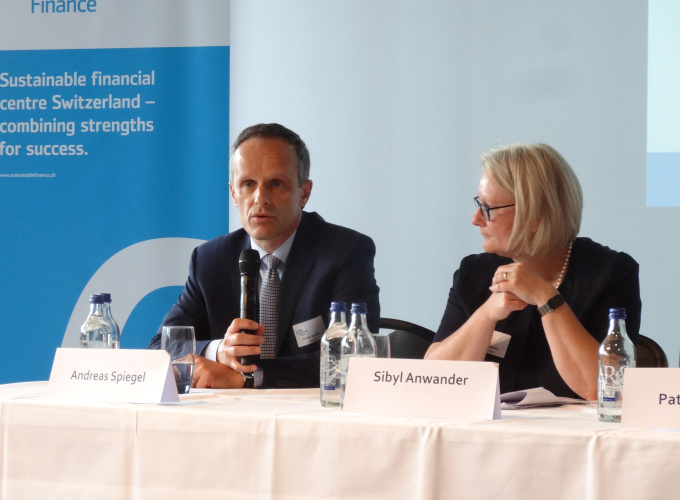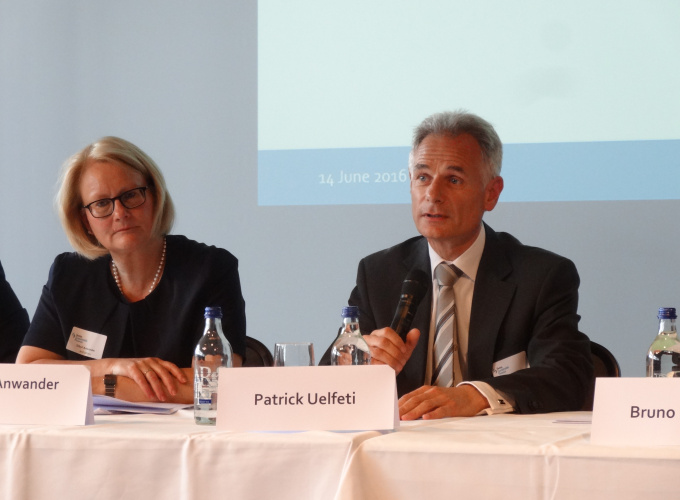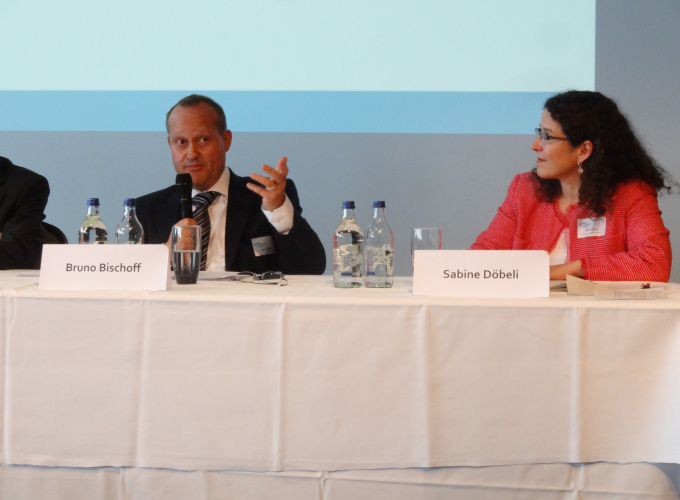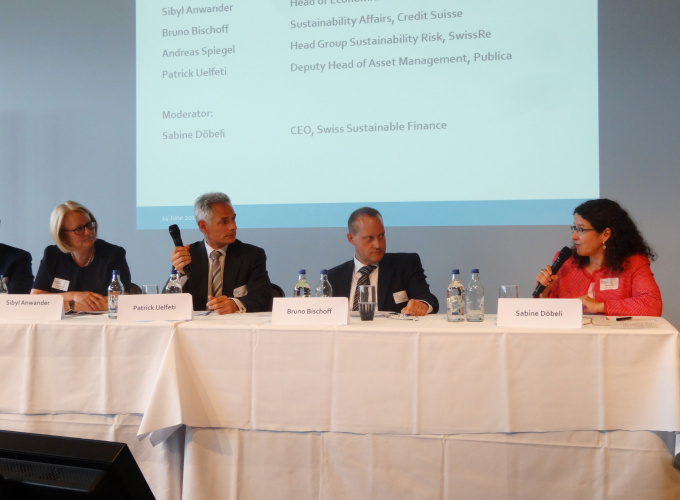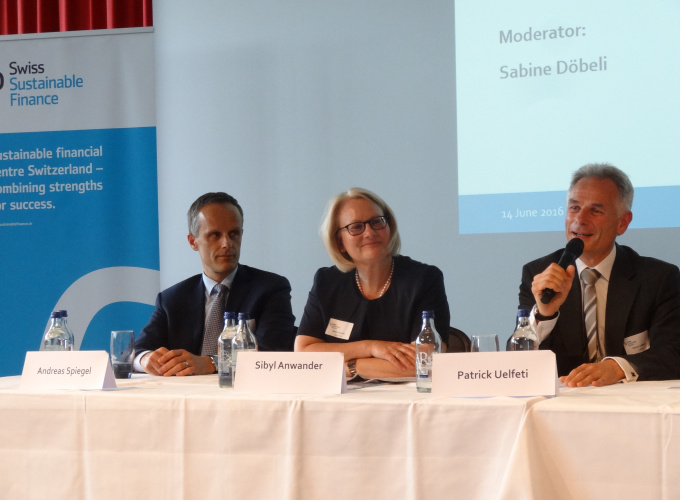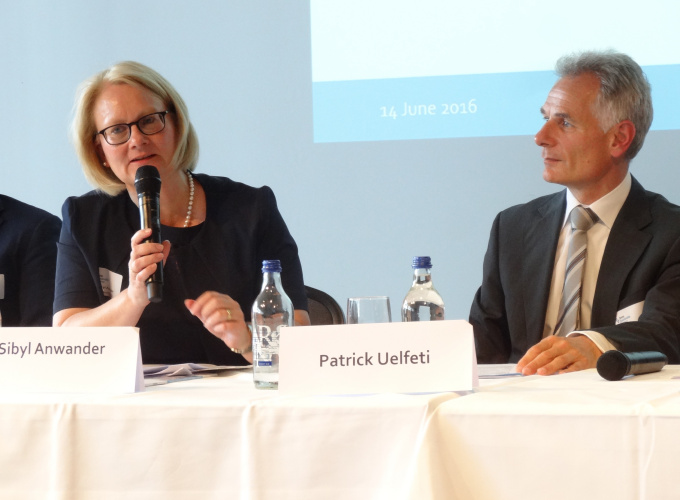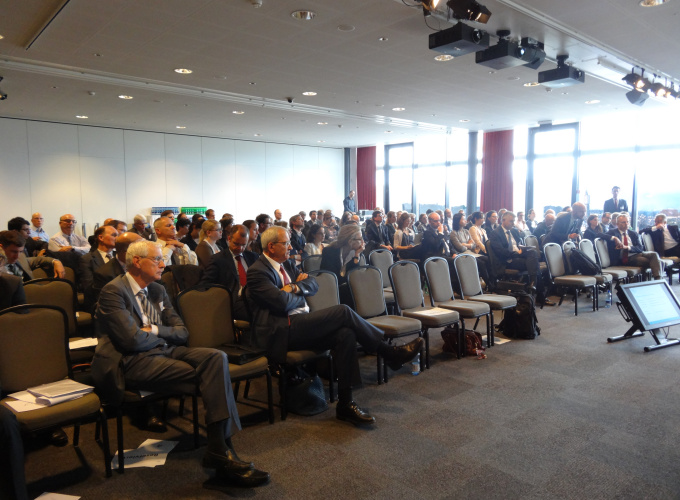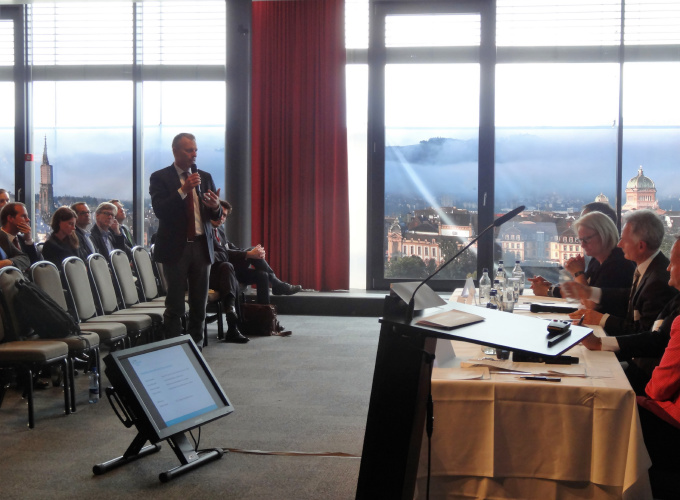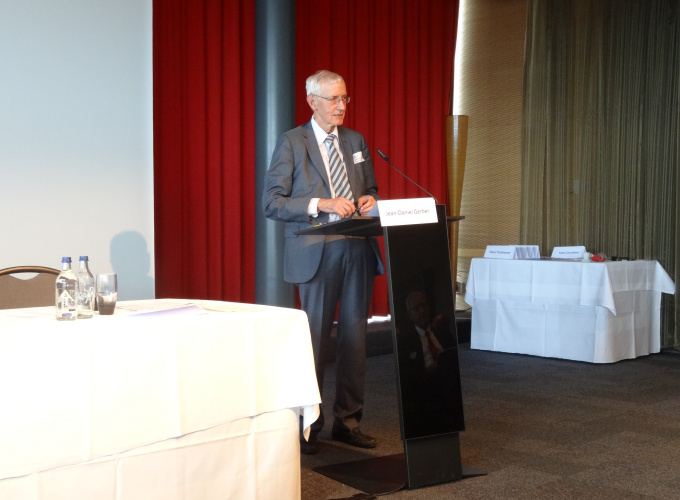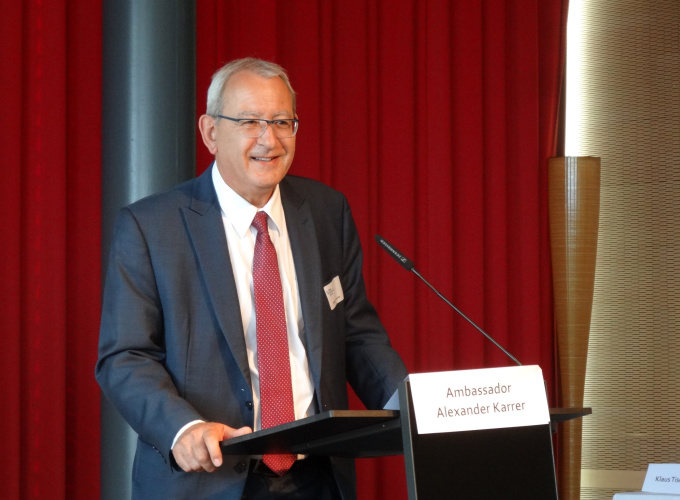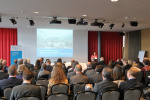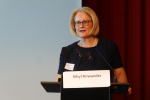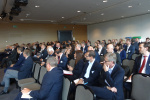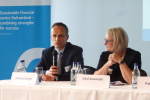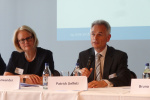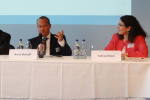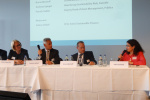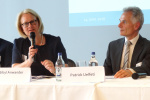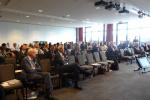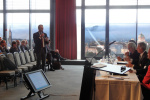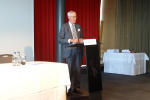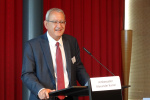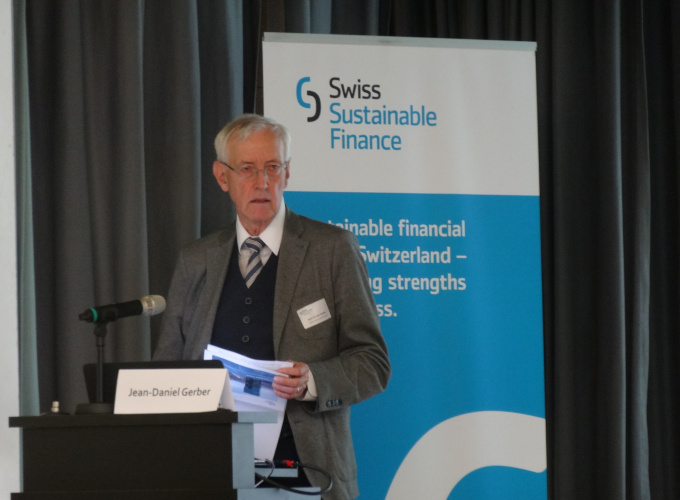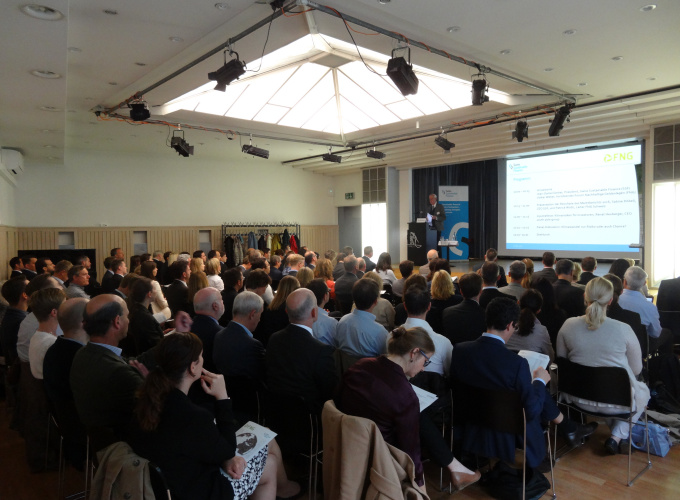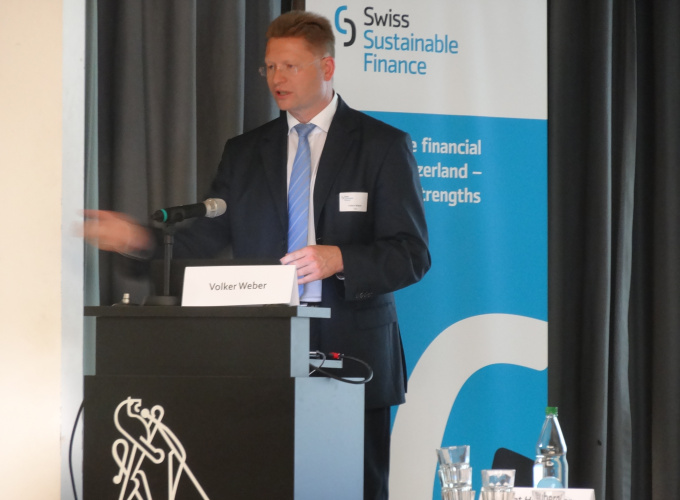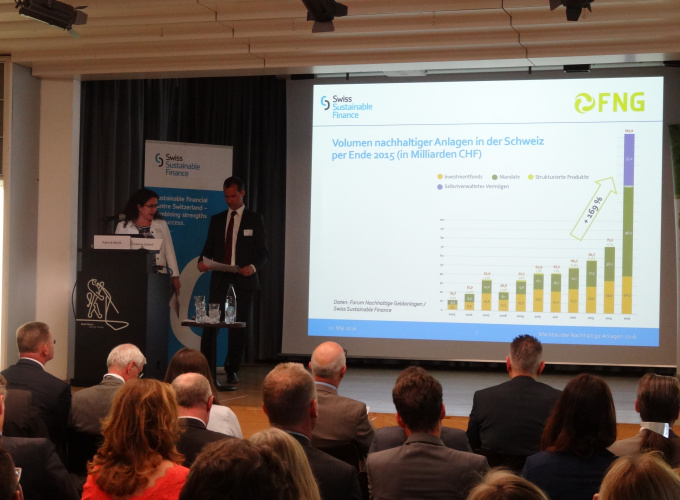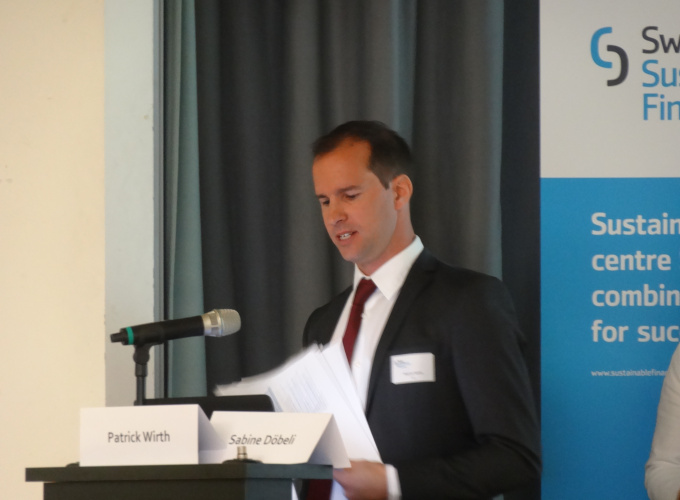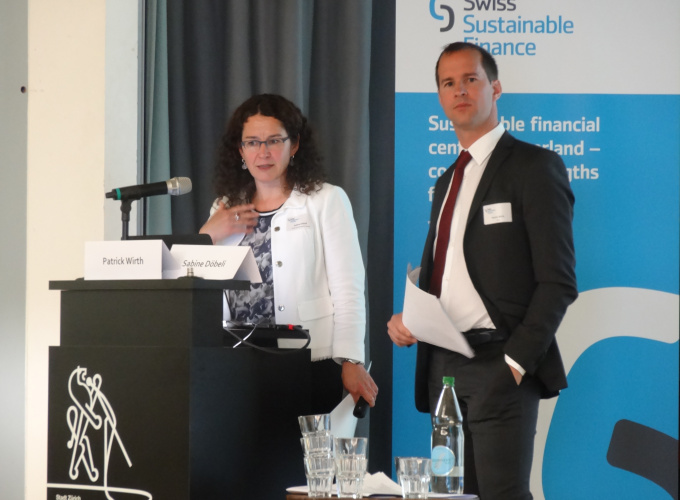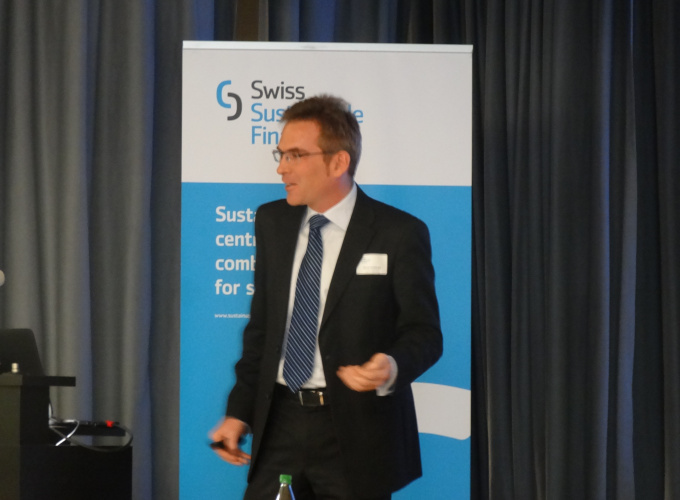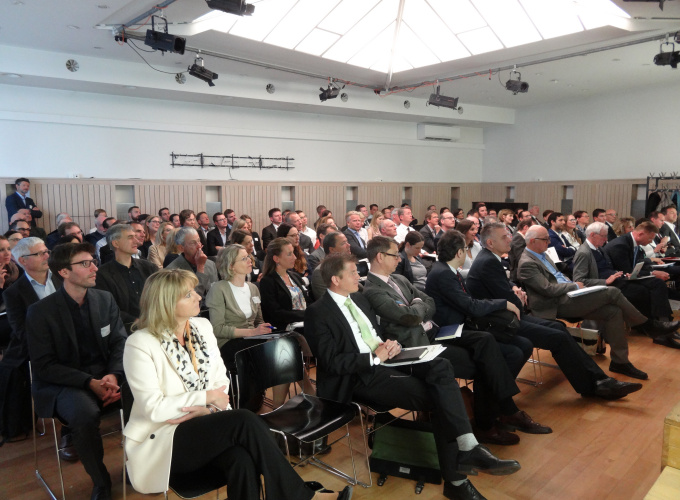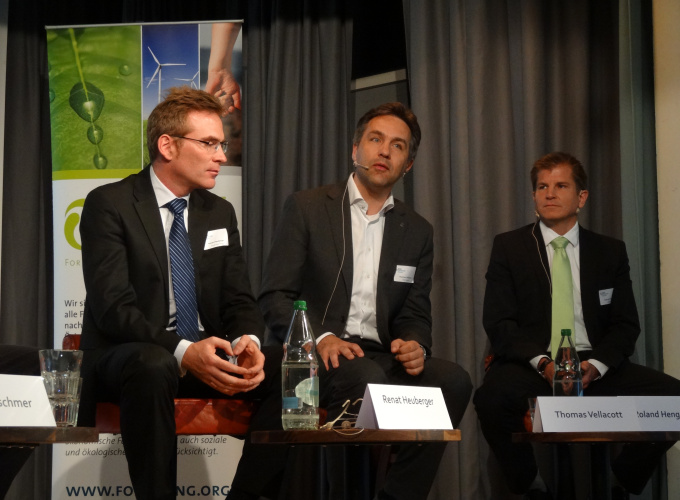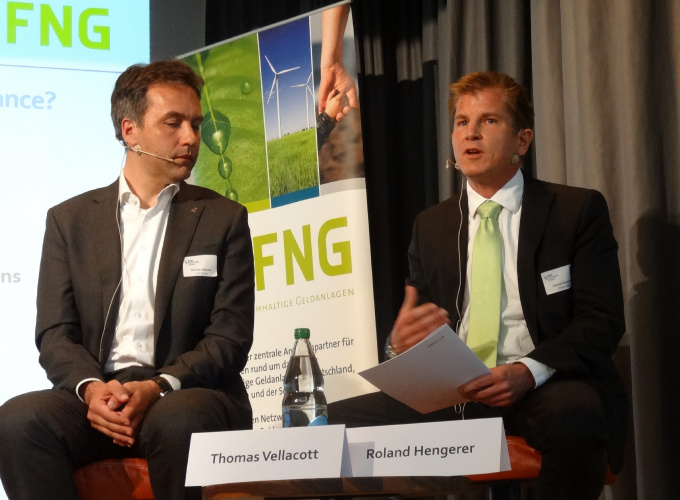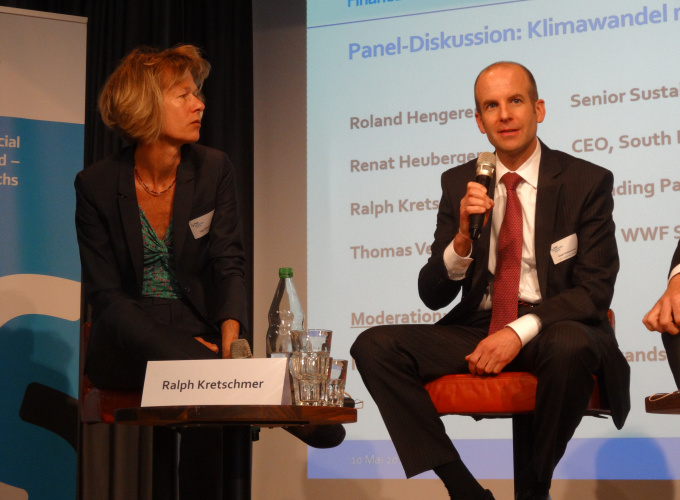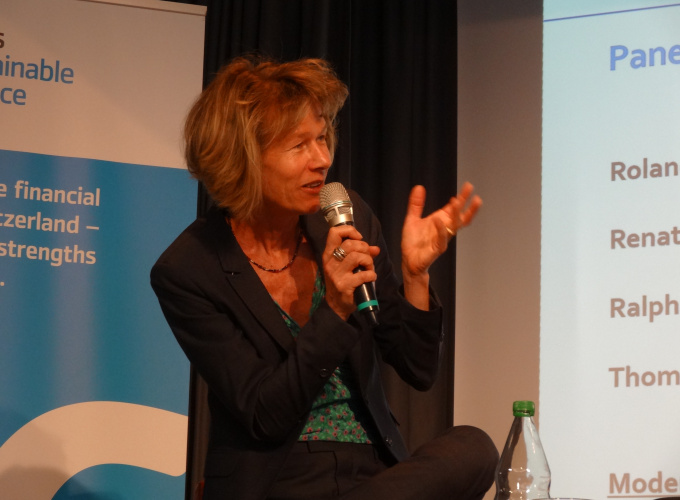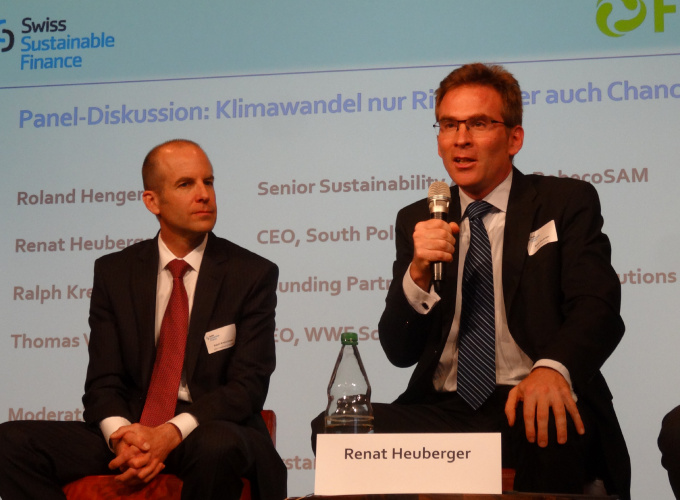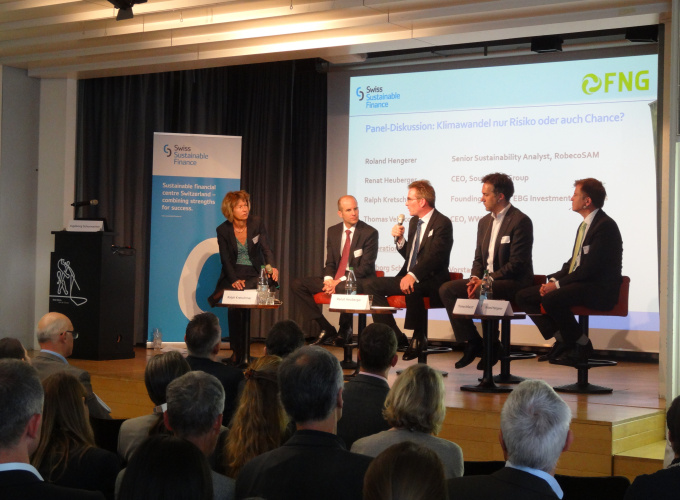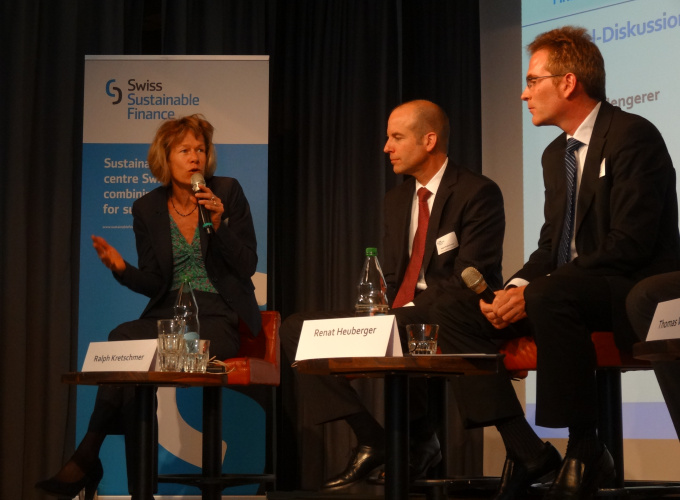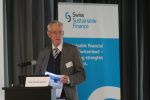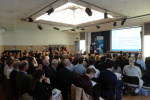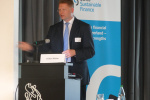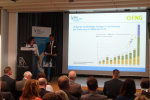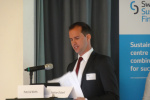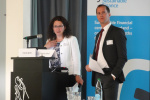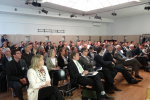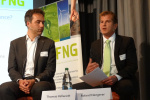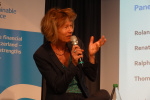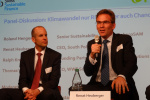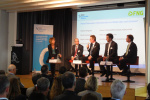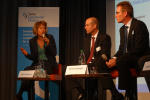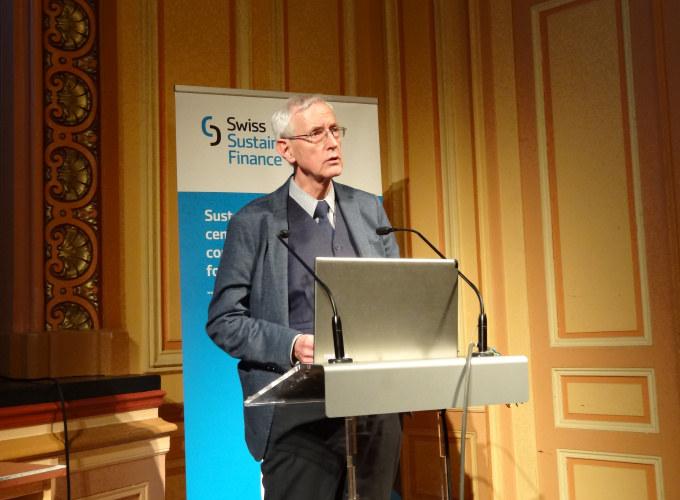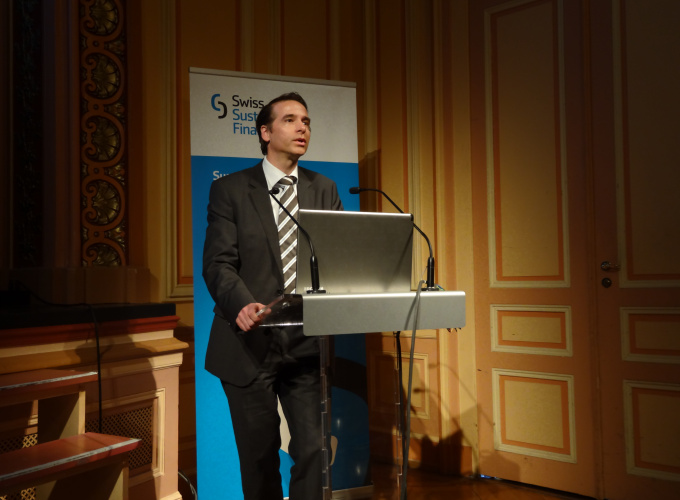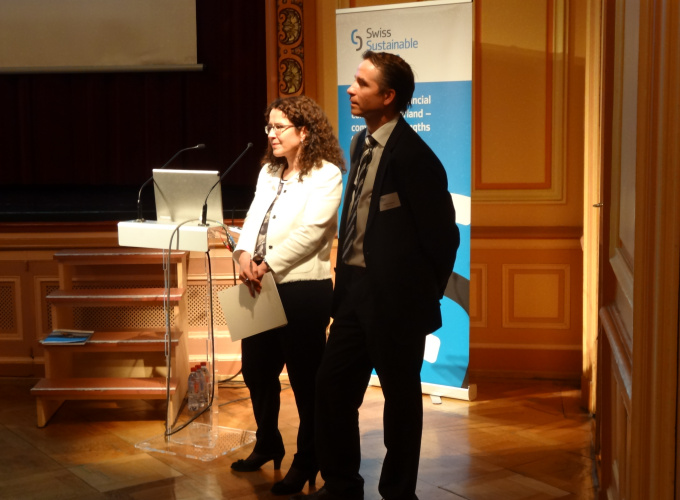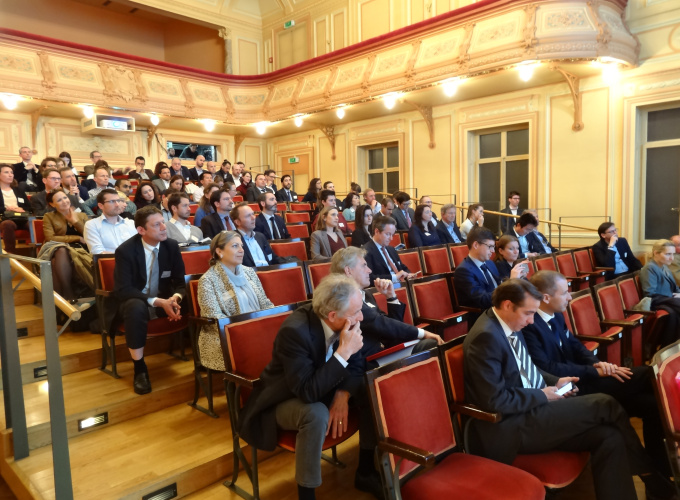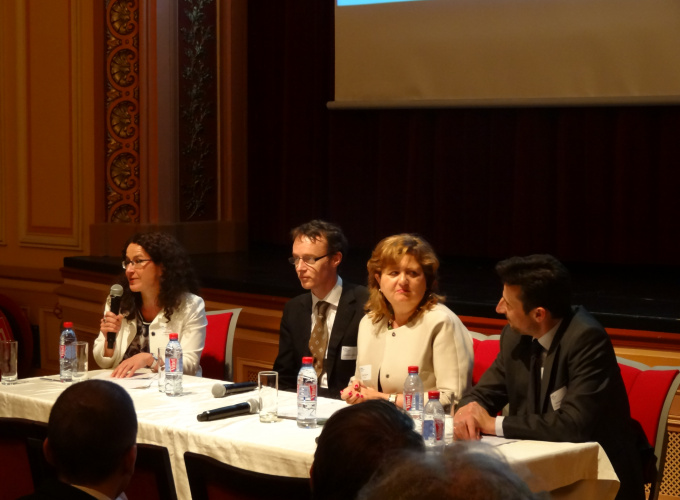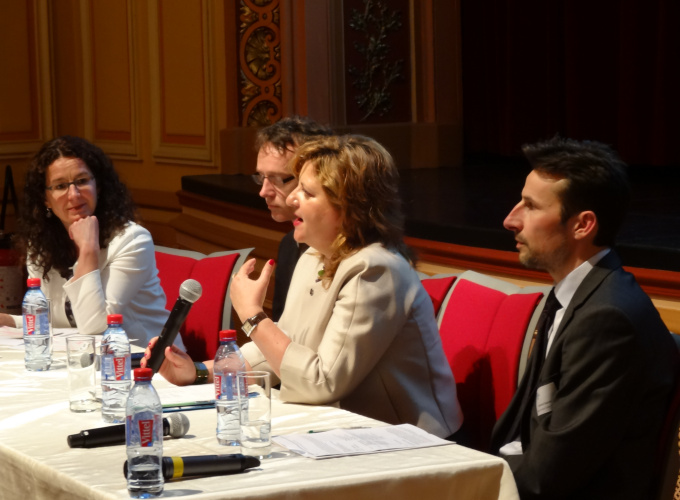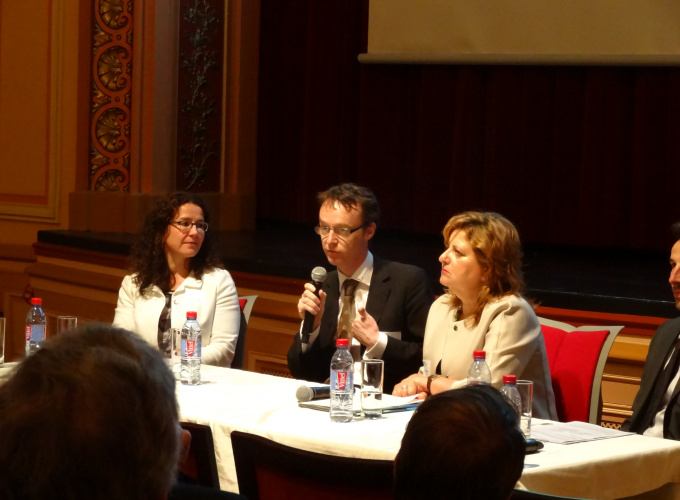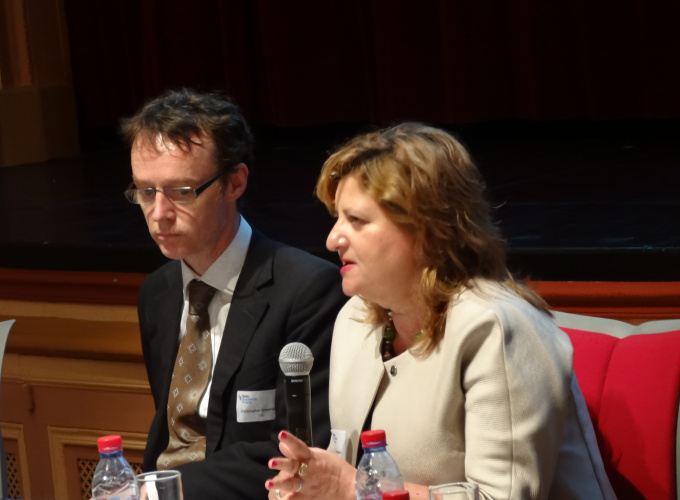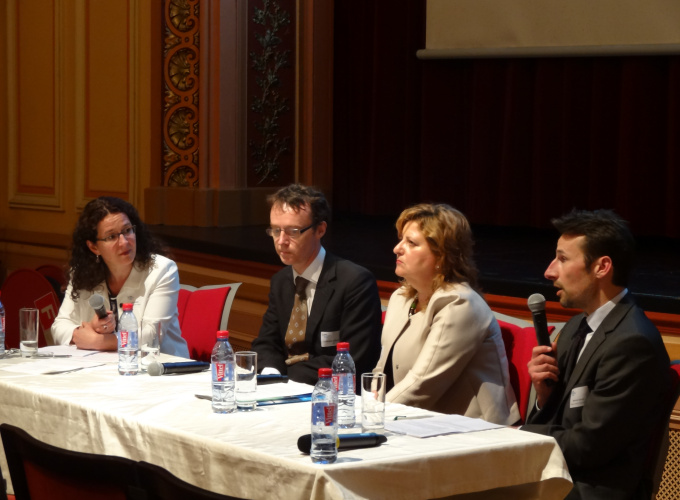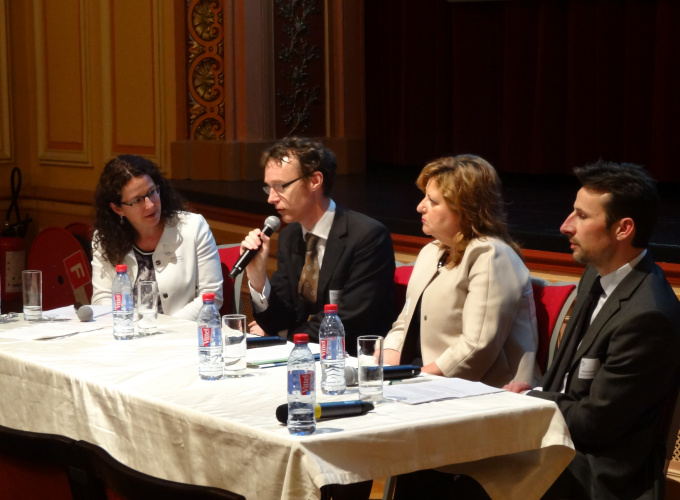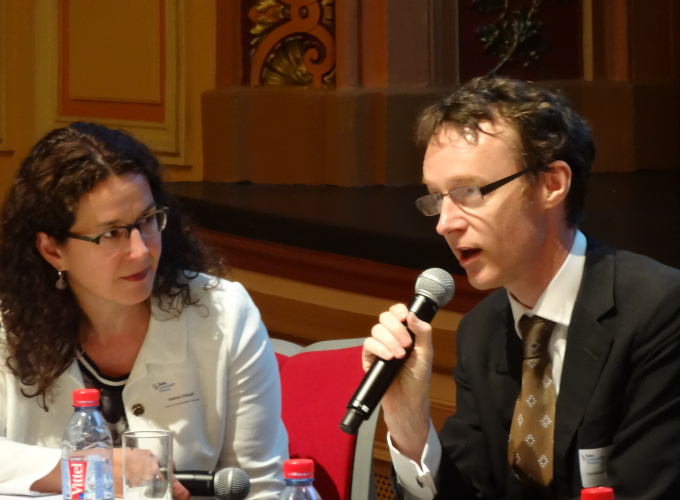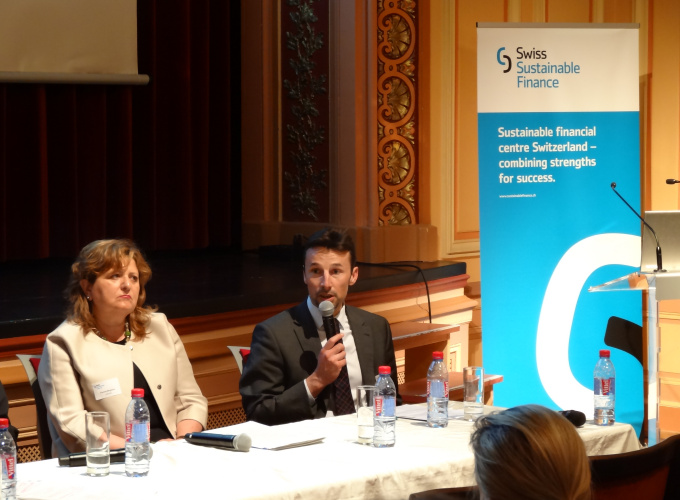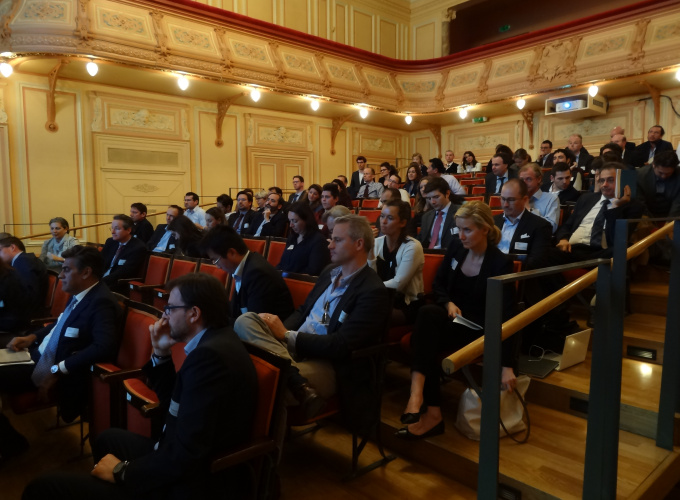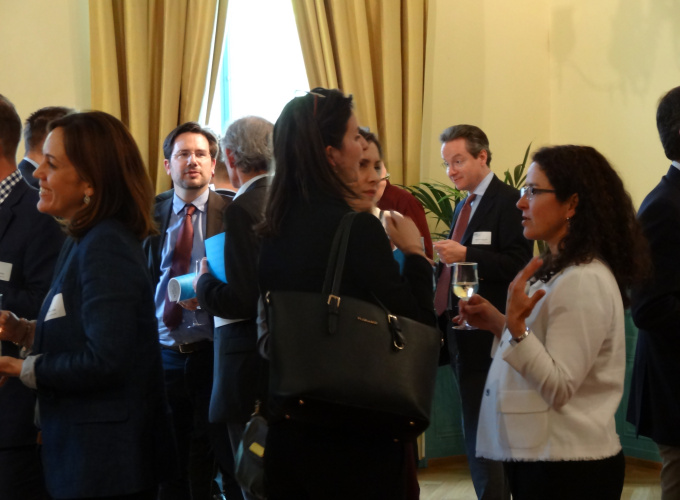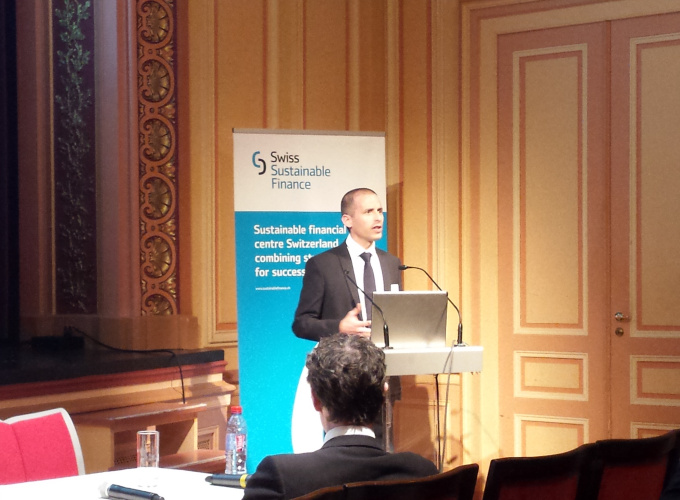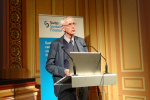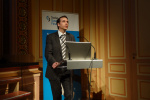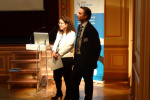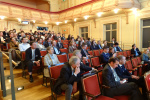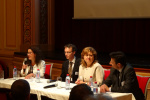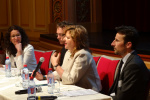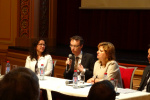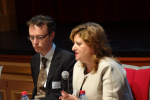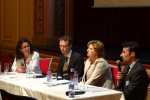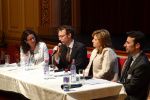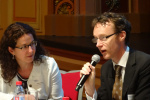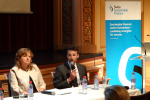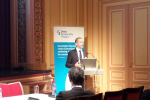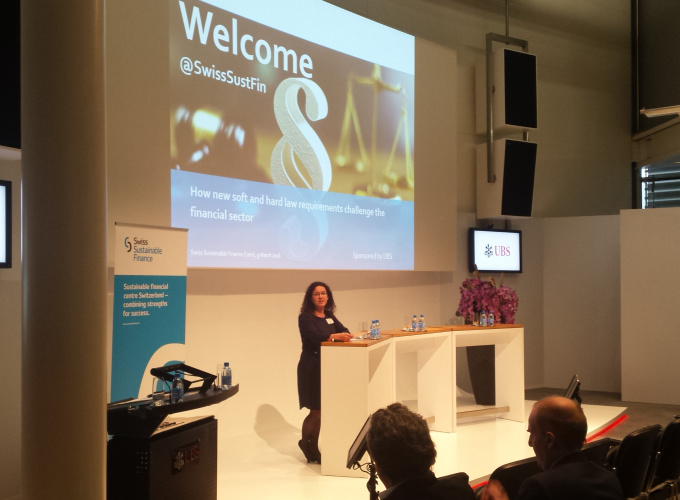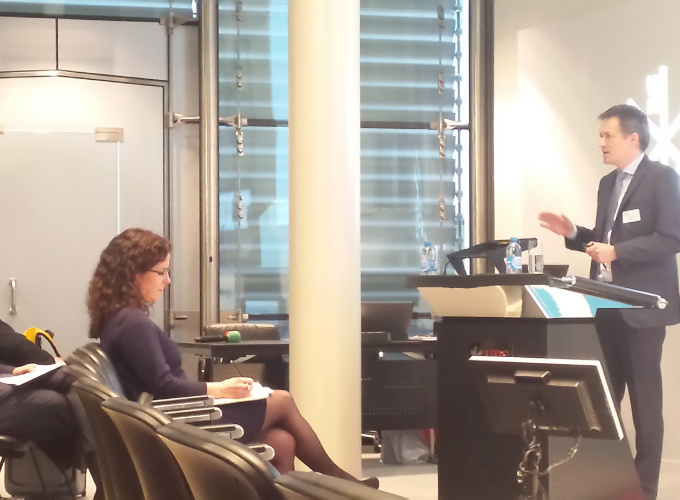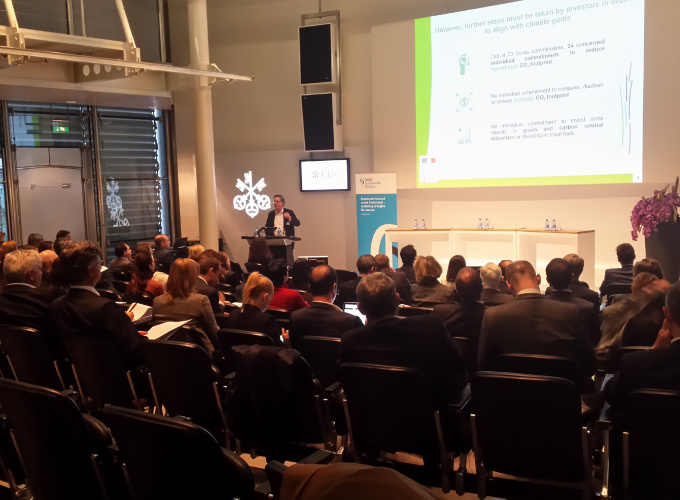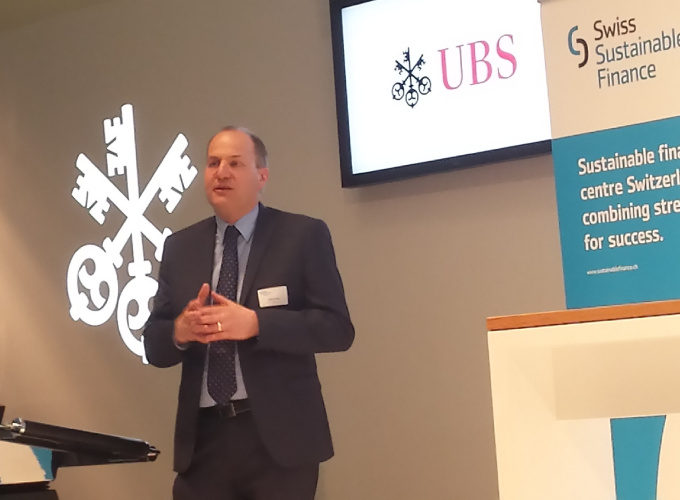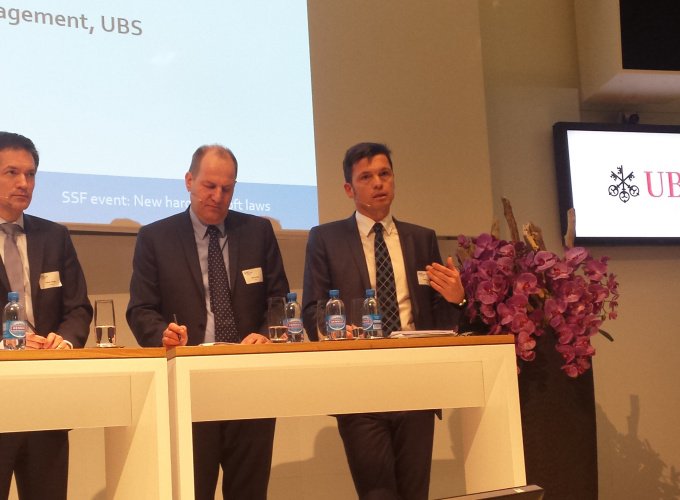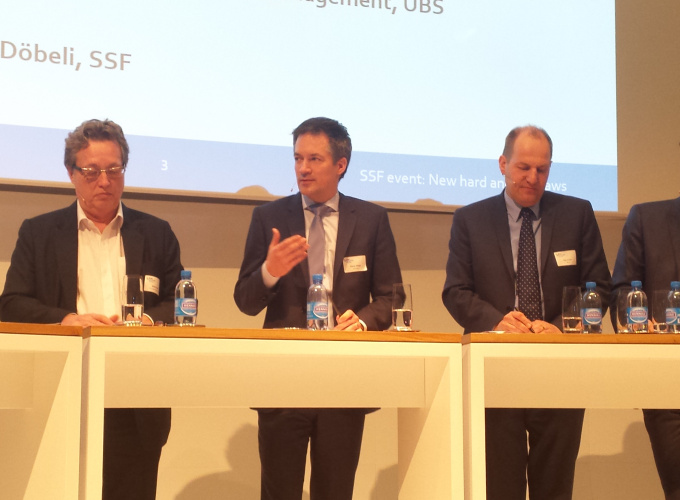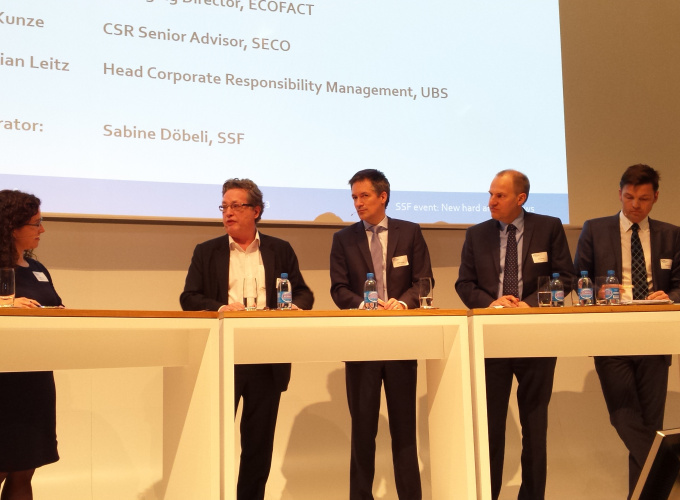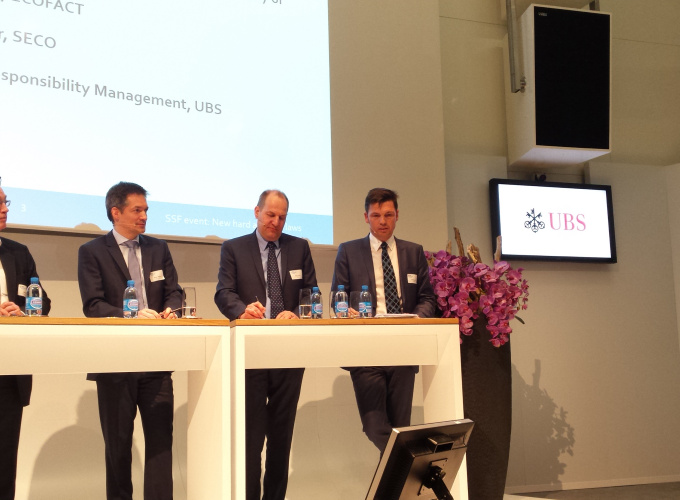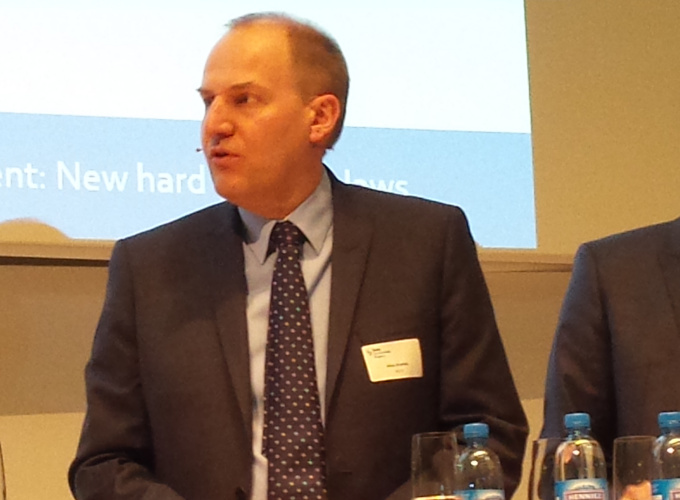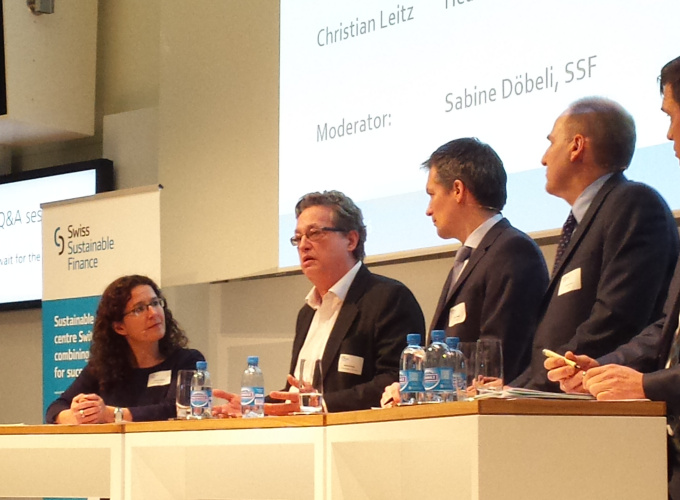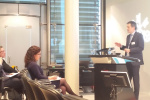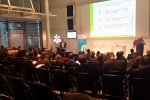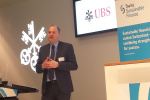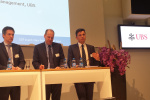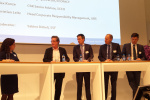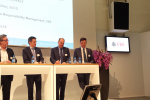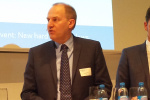SSF Events 2016
28 November 2016, Institutionelle Investoren im Spannungsfeld von Renditedruck und gesellschaftlichen Ansprüchen
At the launch event of the SSF handbook on sustainable investments in Zurich, an audience of over 130 came together to discuss and learn about how institutional asset owners implement sustainable investment strategies. After an introduction by Hubert Niggli (Head of Finance, Suva, and Vice-President, SSF), who welcomed the new SSF handbook as an independent source of information on sustainable investments and stressed the importance of a continued dialogue on the topic amongst Swiss asset owners and managers, further speakers took the stage.
Marcel Jeucken (Managing Director Responsible Investment, PGGM) joined us from the Netherlands to provide practical insights into the sustainable investing strategy of his organisation. PGGM is a pension fund manager with approximately EUR 210 bn assets under management, managing – amongst others – the second largest pension fund of Europe. The company has firmly integrated sustainability factors into the management processes of all asset classes and is considered to be a leader in providing transparency on the impact created with its responsible investment policy. Some key messages that came out during his presentation were that sustainable investing offers better risk-return profiles and access to new investment opportunities and that pension funds have a responsibility to measure and disclose the impact of their capital on society.
Sabine Döbeli (CEO, Swiss Sustainable Finance) followed Mr. Jeucken with the presentation of the SSF handbook on sustainable investments. She emphasized the importance of such a comprehensive publication for Swiss asset owners which provides an overview on existing approaches as well as concrete tips for the implementation of a sustainable investment policy. The fact that the handbook is available in German and French will help break down language barriers. Sabine summarized the content and structure of the handbook and thanked the over 30 authors and contributors from the SSF members’s base, without whom the preparation of the handbook would not have been possible.
To end the event, in a panel moderated by Ivo Knoepfel (Founder, onValues), Anne Gloor (Founder and Board Member, PeaceNexus Foundation), Hubert Niggli, and Patrick Uelfeti (Deputy Head of Asset Management, PUBLICA) offered insights into their own sustainable investment policies and debated barriers they faced in the setup and opportunities linked to the policies. Hubert Niggli stressed the importance to find a positive narrative about sustainable investments and not just see them as limiting. Anne Gloor impressively illustrated how her foundation set up a fund for peace-building, helping the foundation to strengthen the achievement of its mission. Patrick Uelfeti perceives an increasing pressure on Swiss pension funds from the side of beneficiaries and the public to take sustainability factors into account and thinks pension funds should react to this.
Download Marcel Jeucken's Presentation (no longer available)
Download Sabine Döbeli's Presentation
Download SSF handbook on sustainable investments
24 October 2016, Sustainable fashion: la finanza sostenibile incontra la moda sostenibile
On 24 October, SSF was back in Ticino with an event on sustainable fashion. The fashion industry has become very important to the local economy in Ticino with more than 300 companies now located in the area generating more tax revenues than those of the banks. The fashion industry is coming under pressure to better manage sustainability issues within their operations.
SSF CEO, Sabine Döbeli opened the event with some initial insights and an overview of sustainable finance in Switzerland. With two expert speakers, Anna Maria Rugarli (Sustainability & CSR Director EMEA, VF International; President, EOCA - European Outdoor Conservation Association) and Jvan Gaffuri (Senior Manager Sustainability Services, RobecoSAM), the audience gained insights into some of the major sustainability issues the fashion industry is currently facing. Topics such as the efficient use of resources and improved working conditions along the supply chain are key to any company within the fashion industry that is looking to improve its sustainablity profile. Anna Maria Rugarli was able to bring specific examples from VF International, especially outlining the "Responsible Sourcing" initiative. Jvan Gafurri was able to add an investor perspective to the event with examples of how to look at material sustainability issues within the fashion industry. The panel discussion was moderated by Vanni Caratto (Corriere del Ticino), who helped field questions from the audience and added some of his own.
SSF Ticino Representative, Alberto Stival, closed the event with some final thoughts and SSF invited the audience and panel to continue discussions over refreshments.
Download Sabine Döbeli's presentation
Download Anna Maria Rugarli's presentation
Download Jvan Gaffuri's presentation
3 October 2016, Quantifying natural resource risks for lending and investment decisions
120 professionals from 80 institutions came together at an event co-organized by SSF, the Natural Capital Declaration (NCD), SECO and sponsored by UBS. The event brought together expert speakers and panellists to discuss how addressing the hidden and externalized costs of resource consumption in different sectors will be increasingly pertinent for the financial industry in order to better understand credit risk, protect investment returns and improve insurance industry resilience to a changing operating environment.
The event was opened by Andrew Mitchell (Founder Director, GCP and Co-Director, NCD), who acted as a master of ceremonies, by giving an overview on the growing importance natural resource risks have gained in public perception.
In her initial statement, Caroline Anstey (Head UBS and Society) emphasized that the race to the top has started and the business case has made itself for incorporating these natural capital issues within the financial industry. She further announced that UBS has become a supporter of the NCD project by sending an expert to the advisory council. Liliana de Sà Kirchknopf (Head of Private Sector Development Division, SECO) outlined that the NCD fit very well with the aim of the SECO in encouraging industry-led, voluntary and market-based approaches, which is why SECO has supported the NCD project. Eric Usher (Head UNEP FI and NCD Co-Director) and Marie Morice (Programme Lead for the NCD secretariat) outlined the goals and milestones of the NCD. Although they see momentum in the market, for a transformation there still is more to do. Avant-garde initiatives and leadership are needed to move the industry forward with great examples already out there in the form of the Sustainable Stock Exchange initiative or the growth of the green bond market.
The keynote speech was held by Dominic Waughray (Head of Public Private Partnership, WEF). Dominic brought the macro perspective into the room with examples about how the interconnectedness of our current global economy cannot be ignored when we discuss natural capital issues. First, he named the top risks as mapped in the latest WEF risk report: climate change, water stress and migration. To make his points concrete, he illustrated them with examples such as the amount of water needed for coal-based electricity production in the US and India.
Two practitioners Lisolette Arni (Head of Environmental and Social Risk, UBS) and Giorgio Capurri (Group Sustainability, UniCredit) outlined their corporate efforts in taking natural capital into account in their own portfolios. Both organisations did a stress test for natural resource risk regarding the banks’ assets, increasing the understanding of the topic within the bank. The event ended with a panel discussion moderated by Sabine Döbeli (CEO, SSF). The panelists further had a chance to define some of the key risks and opportunities revolving around natural capital. They stressed the need for better tools and data as well as standards and terms of disclosure.
Download event program
Download NCD presentation
Download WEF presentation
Listen to Dominic Waughray's Keynote
14 June 2016, SSF Members' Assembly side-event - Launch of report: Proposals for a Roadmap towards a sustainable financial system in Switzerland
As part of the annual Members’ Assembly, SSF invited a wider audience to join our members and network partners to be present for the official launch of the report “Proposals for a Roadmap towards a Sustainable Financial System in Switzerland.”
Sibyl Anwander, Head of the Economics and Innovation Department at the Federal Office of the Environment (FOEN) presented 20 concrete measures drafted by a diverse project team of finance experts, representatives of science and federal authorities coordinated by FOEN. Specific proposals for action were put forward to promote sustainable financial services taking into account environmental, social and governance criteria in the five segments asset & wealth management, institutional investors, credit & lending, capital markets and research & education.
An expert panel joined Sibyl Anwander on stage to debate the role of these proposals for reinforcing Switzerland’s status as a leading international centre for asset and wealth management. The panel included Bruno Bischoff (Sustainability Affairs, Credit Suisse), Andreas Spiegel (Head Group Sustainability Risk, Swiss Re) and Patrick Uelfeti (Deputy Head of Asset management, Publica).
Ambassador Alexander Karrer, Deputy State Secretary and Head of Multilateral Affairs at the State Secretariat for International Financial Matters (SIF), subsequently gave a talk emphasising the importance of international developments in the area of Green Finance and highlighting the active role that Switzerland plays in these processes. He further underlined the importance of better understanding environmental risks in the financial context.
Download Sibyl Anwander's Presentation
Download Ambassador Karrer's speech
10 May 2016, Launch of 2016 Swiss market report on sustainable investments
At this event jointly organised by Forum Nachhaltige Geldanlagen (FNG) and Swiss Sustainable Finance (SSF) and attended by over 100 professionals, the results of the 2016 market report of sustainable investments in Switzerland was presented, followed by a panel discussion on the topic of the risks and opportunities associated with climate change.
Jean-Daniel Gerber (President, SSF) and Volker Weber (Chairman, FNG) opened the event, reflecting on the increasing public interest in sustainable finance generally and particularly in sustainable investing. Sabine Döbeli (CEO, SFF) and Patrick Wirth (Vice Chairman, FNG) presented the impressive results of the evolution in sustainable investments in 2015. They provided details on the 169% growth in investments, totalling CHF 191.2bn and therewith gaining considerable market share. Renat Heuberger (CEO, South Pole Group) then shed light on the climate risks and opportunities for investors, substantiating it with evidence from the renewable energy sector. The panel discussion on risks and opportunities linked to climate change, moderated by Ingeborg Schumacher (board member, FNG), included Renat Heuberger, Thomas Velacott (CEO, WWF Switzerland), Ralph Kretschmer (Founding Partner, EBG Investment Solutions) and Roland Hengerer (Senior Sustainability Analyst, RobecoSAM). The panel discussed, on the one hand, the important mainstreaming effort that has been achieved, especially in the last year, and the strong momentum that sustainable investing is currently seeing. On the other hand, the speakers agreed that there is not only room for growth, but also a necessity for institutional investors, the civil society, and the regulators to move ahead rapidly and make climate risks and sustainability factors a normal part of investment processes.
Download the market study presentation
Download the presentation of Renat Heuberger
12 April 2016, Swiss investments for development contributing to a sustainable world
The first SSF publication, “Swiss Investments for a Better World” was well received at an event attracting over 80 professionals in Geneva. SSF in partnership with SFG, hosted this event to present the results of the first market survey on “Investments for Development,“ a term defined by the SSF Workgroup. Such investments involve a clear intention to improve the social, environmental and/or economic situation in developing countries while aiming for market return. To introduce the topic, Jean-Daniel Gerber, President SSF, defined relevant preconditions to access private sector investments to foster development. He stressed the importance of putting incentives over subsidies to encourage entrepreneurship in developing countries. Frédéric Berney, CRO BlueOrchard, then presented the impressive volume of investments for development managed out of Switzerland, totaling 10 Billion USD, representing around 1/3 of global assets in this segment. The study further showed a CAGR of 18.4%. Although the largest share flows into Microfinance, other sectors play an increasingly important role. One of the challenges of this sector will be to demonstrate the benefits for society linked to such investment products and develop comparable key performance indicators. However, the average annual target return of 4.5% illustrates the attractiveness of this segment both for institutional and private investors and justifies further commitments by the Swiss industry to remain at the forefront of this investment segment.
Following the presentation of the study results, a panel discussion, moderated by Sabine Döbeli, CEO SSF, focused on different roles of private and public entities in providing financial support and solutions to alleviate some of the challenges currently existing in the developing world. Fiorina Mugione, Chief Entrepreneurship Section UNCTAD, began the conversation by presenting their Empretec program, which provides technical assistance and training to entrepreneurs in low-income countries. Christopher Greenwood, Responsible for Innovative Financing at ICRC, presented a concrete example of an innovative investment product designed to mobilize private investments to fund health centers in conflict regions (humanitarian impact bond of ICRC). Bringing in the view from the private sector, Bertrand Gacon, Head Impact Investing & SRI, Lombard Odier and President SFG, outlined key success factors to make these topics successful and more investable: Innovation and scalability.
The key take-home message of the evening is that Switzerland has all the prerequisites to play an even larger role in financing development. It will be important for SSF and its network to influence discussions and contribute to setting up the right frameworks for such investments.
9 March 2016, How new soft and hard law requirements challenge the financial sector
At this event speakers and panellists addressed an audience of around 100 professionals and shed light on the rapidly evolving regulatory environment pertaining to corporate responsibility and sustainability. The group discussed the risks and opportunities that financial institutions face due to new soft and hard law initiatives related to environmental and human rights issues and how banks, insurers, and asset managers can make sure they are prepared for the changes ahead.
Robin Edme, Senior Advisor Responsible Finance to the French Ministry of Ecology, clarified that under the new French law “energy transition for green growth” which came into effect in January 2016, financial service providers and investors are obliged to publish the carbon emissions of their investments. Alex Kunze, CSR Senior Advisor at SECO, discussed the CSR Position Paper of the Federal Council, which states that the implementation of such topics should be primarily carried out by companies themselves. Using specific examples Olivier Jaeggi, Managing Director of Ecofact, showed how voluntary regulations - for example, the OECD Guidelines for Multinational Enterprises - may become binding over time.
Sabine Döbeli, CEO of Swiss Sustainable Finance, stressed that this increasing regulatory demand on financial services, with respect to environmental and social standards, while posing challenges, can also open new opportunities. Christian Leitz, Head Corporate Responsibility Management UBS, added: "In many financial institutions, the process of careful examination of environmental and human rights issues in lending activities has already been established." This expertise flows directly into their dialogue with relevant authorities, borrowers and other stakeholders and thus, helps to further improve relevant standards. The panel also touched on the growing expectation of institutional and private investors towards their asset managers to integrate sustainability issues into investment processes. Many Swiss asset managers, according to the experts, can build on years of experience and by this gain ground in the rapidly expanding sustainable investment market. A ‘smart mix’ of voluntary and mandatory measures was seen as the best way for the further promotion of sustainability in the financial industry.
Download presentation of Olivier Jaeggi
Download presentation of Robin Edme
Download presentation of Alex Kunze
Download the CSR Position paper of the Swiss Federal Council (German / French)
Download paper by Judson Berkey: Sustainability Legal Pressure Points for Financial Services
7 March 2016, 2015 Paris Climate Conference: what are the consequences?
BSI Gamma Foundation in collaboration with SSF held a conference in Lugano to examine the impact of the Paris Agreement resolutions from economic, industrial and financial points of view.
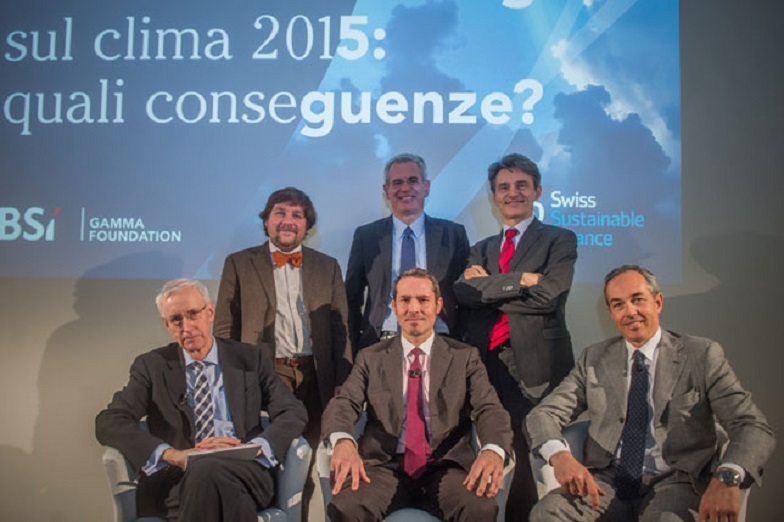
The evening started with presentations from Carlo Cararo (Full Professor and Rector Emeritus of the Ca’ Foscari University, Venice) and Luca Mercalli (President and Editor in Chief, Società Meteorologica Italiana) who showed the immediate need for action but also emphasized that Switzerland is one of the strongest actors with respect to their current emissions reduction efforts. They clarified that in order to meet targets, global emissions would not only need to be reduced in the near future, but we will also need vast technological advances to be able to capture and store much of the emissions we currently have today. With a key take-home message that we do need to phase out coal, remove subsidies on fossil fuels, improve energy efficiency and achieve technological breakthroughs, the need for private and public sector investments is urgent.
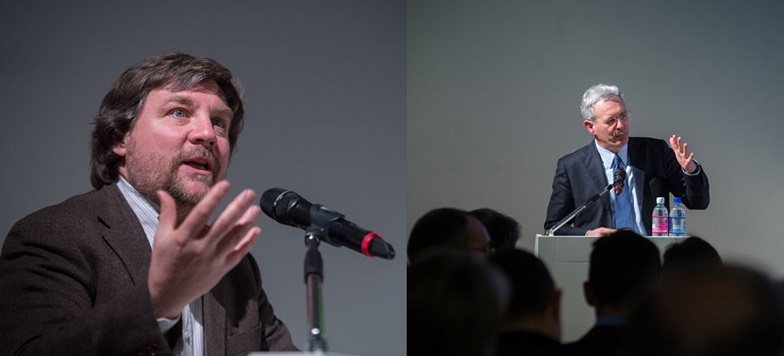
Following the academic introduction to the topic, a panel, moderated by Luca Fasani (Head of Economy, RSI Swiss Radio TV), touched on the practitioners’ views on the topic of sustainable investments that will help reach international targets.
Jean-Daniel Gerber (President, Swiss Sustainable Finance), stressed the need to support innovators in the field and break down some of the barriers that keep the industry in a short-term mindset. He expressed his optimism in reaching our targets taking the millennial goals as an example, which were reached 5 years ahead of schedule.
Gianluca Manca (Head of Sustainability, Eurizon Capital, Intesa Sanpaolo Group), expressed that awareness is still quite low and we need to take measures to improve communication on the topic to increase awareness within and outside of the industry. He commended some of the larger institutional asset owners who have been taking a stand.
Marco Zanetti (Chairman, Airlight Energy), reiterated that awareness is a key factor in the success and that investing in R & D for long-term solutions should not be underestimated.
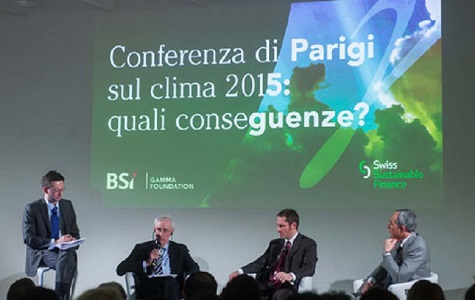
As the marginal costs for improving efficiency and reducing emissions are much lower in the developing world, careful consideration of where/when/how to finance projects is necessary to efficiently and effectively fight the battle against climate change.
1/2 February 2016, AZEK Campus: The effects of short-termism and sustainability factors on the financial sector, corporates and the work of financial analysts
AZEK and SSF co-organised two one-day workshops in Geneva (1 February) and Zurich (2 February), for finance experts. The aim of this event was to showcase how the short-term perspective impacts the financial markets, listed companies and analysts, outline underlying reasons to this phenomena and lastly, discuss how sustainable investing could be a solution for long-term profits. The two events managed to attracted over 150 professionals.
Thierry Lacraz (Executive Vice President at Pictet) and Stephan Meier (Partner Artico Partners) discussed how the incentives structures (e.g. remuneration) or new actors (e.g. hedge funds) created an increased focus on short-term profits. Another discussion topic brought up by Philip Valta (Assistant Professor of Finance University of Geneva) was that listed companies became increasingly pressured to deliver short-term returns, illustrated through the examples of CEO payment and the increasing use of “share-buy-backs”. The influence of this short-term pressure on financial analysts was covered by Philipp Krüger (Assistant Professor of Responsible Finance University of Geneva). He indicated some main drivers of short-termism, such as remuneration structures and the important role of quarterly earnings statements in financial statements.
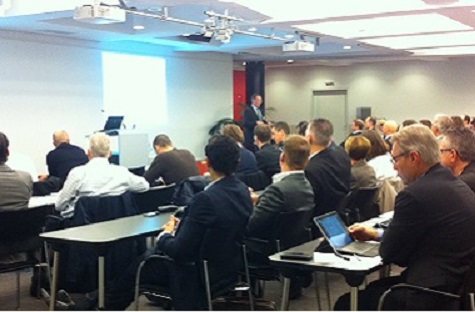
Some of these shortcomings can be countered by integrating ESG data in fundamental financial analysis – showcased through the example of stranded assets discussed by René Nicolodi (Head of Equities ZKB). Philipp Krüger, provided academic evidence based on his study which shows a positive correlation between ESG and financial performance of listed companies. Thereby ESG performance correlated positively with Cash Flow and negatively with Weighted Average Cost of Capital. Sabine Döbeli (CEO SSF) and Jean Laville (Deputy CEO SSF) underlined that there is an increasing demand for sustainable investing, especially by institutional investors and regulators in Europe, slowly also taking up in Switzerland.
The workshop closed with the analysis of a case study company from a “traditional” analyst perspective (Andreas von Arx (Baader-Helvea) and Claudia von Türk (Banque Lombard Odier & Cie S.A.)) and an ESG analyst perspective (Simon Perrin (Vescore SA) and Marion Swoboda (ZKB)). It became clear that both approaches share common difficulties such as the access to information, or its comparability and reliability.
One of the clear messages of the workshop was that it is in the interest of Swiss asset managers to increasingly consider ESG factors. This creates new investment opportunities, reduces risks and strengthens thereby the competitive advantage of the Swiss asset management sector.
Full program




